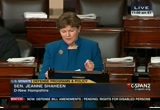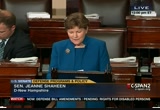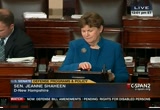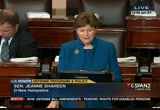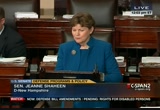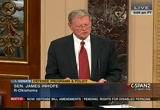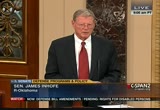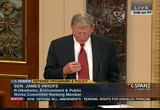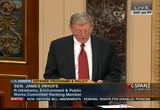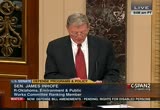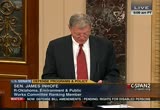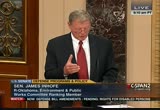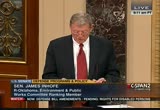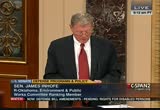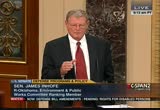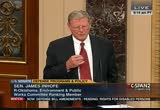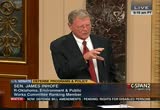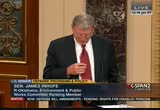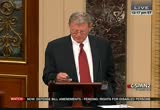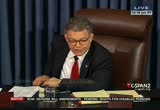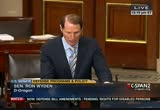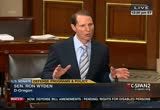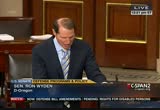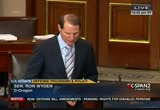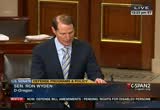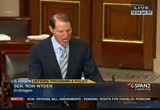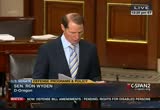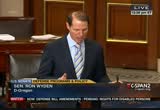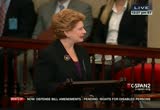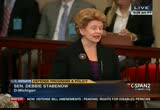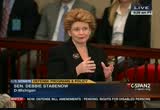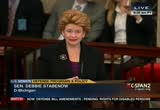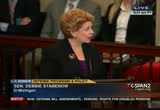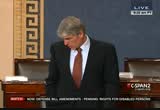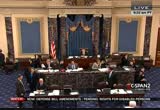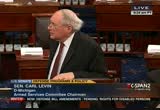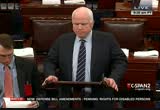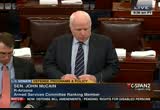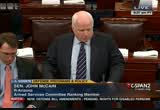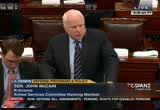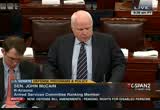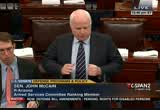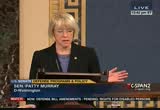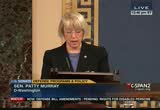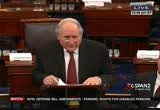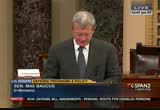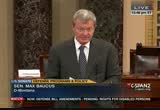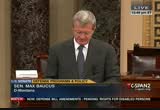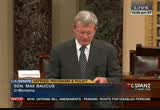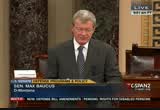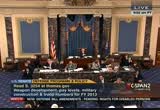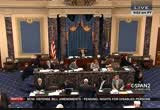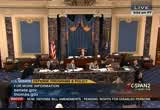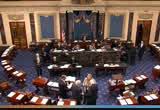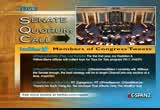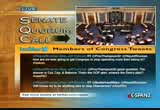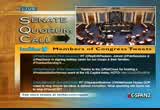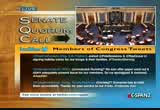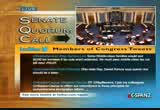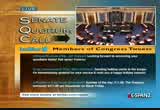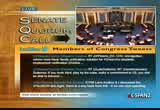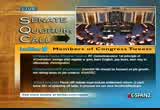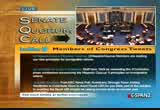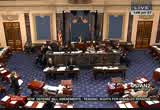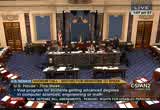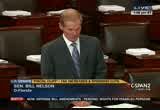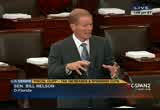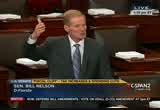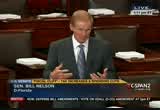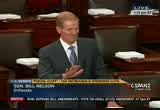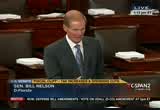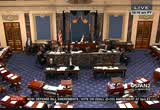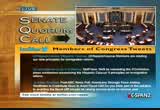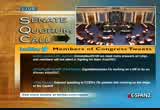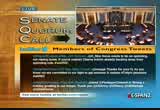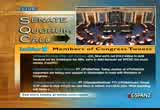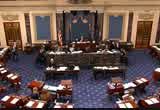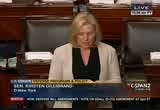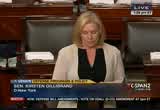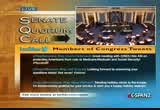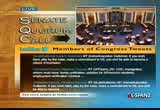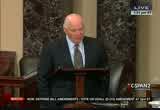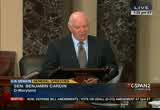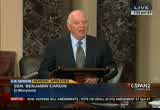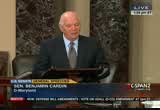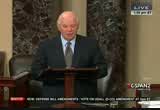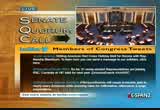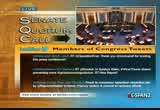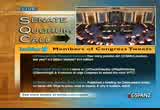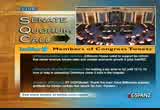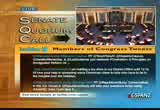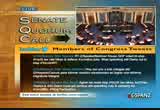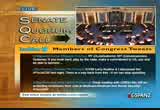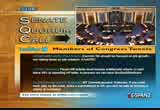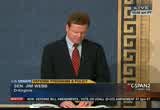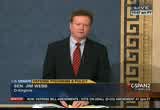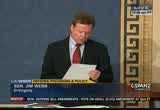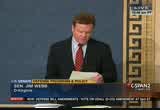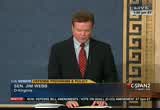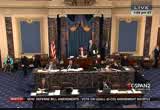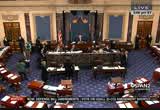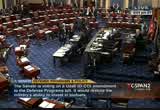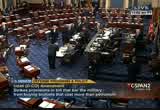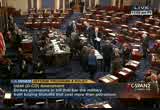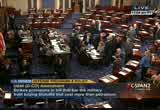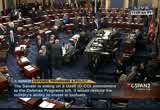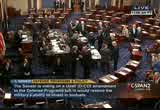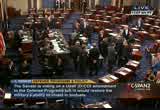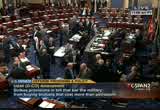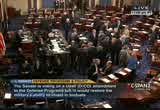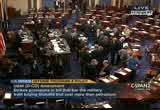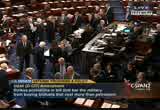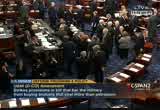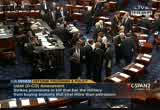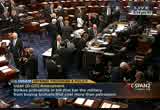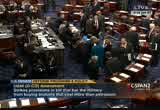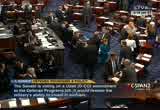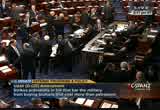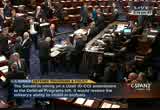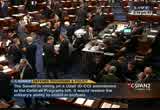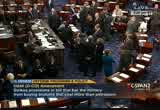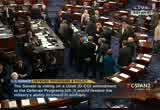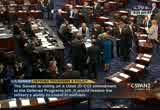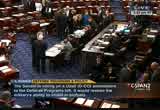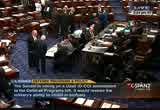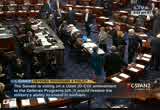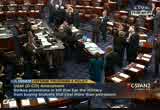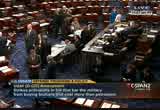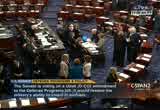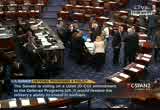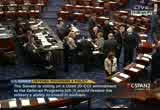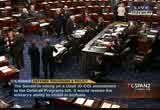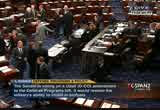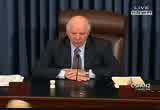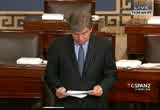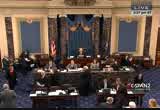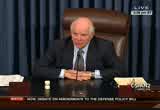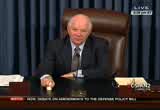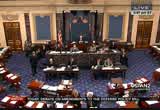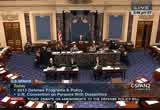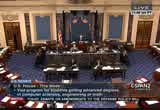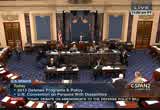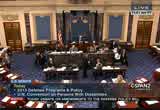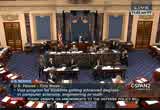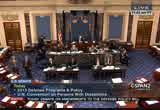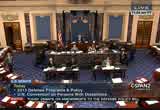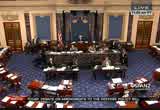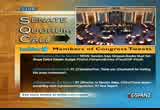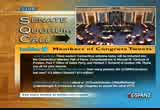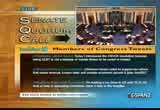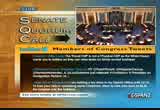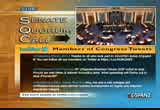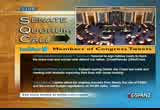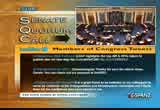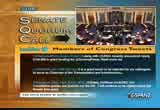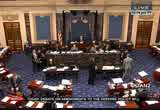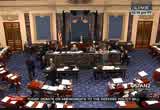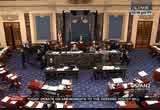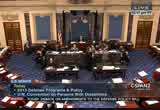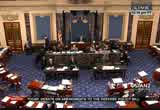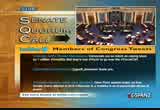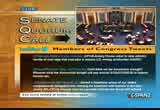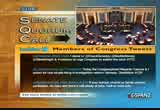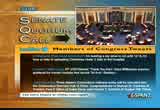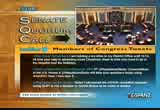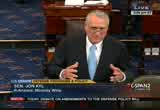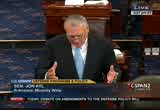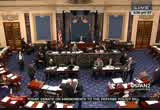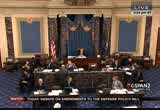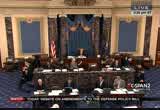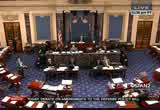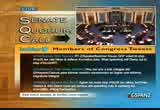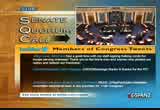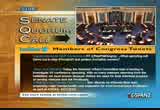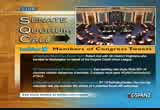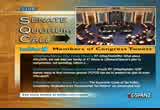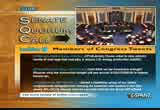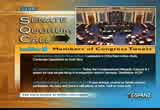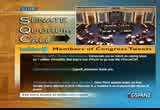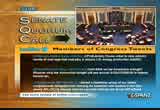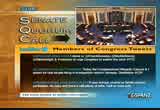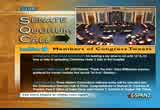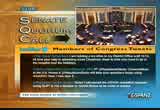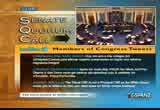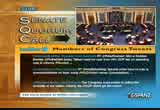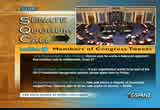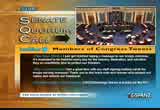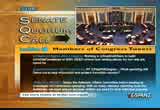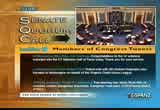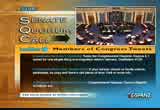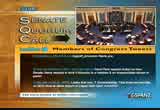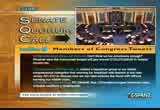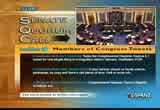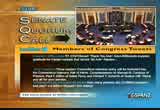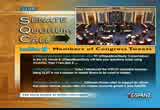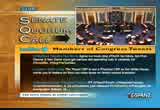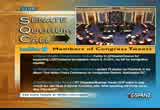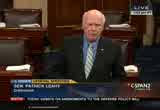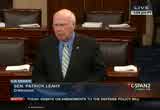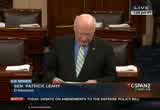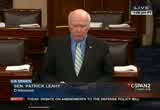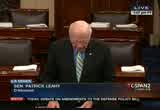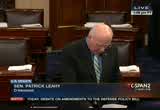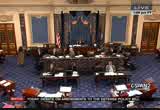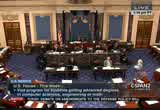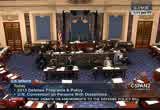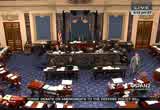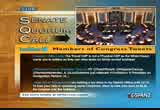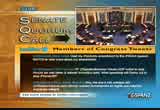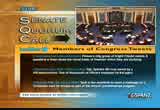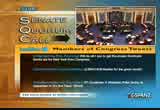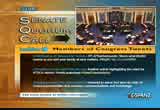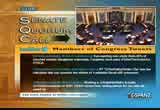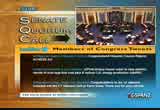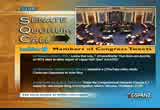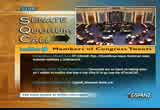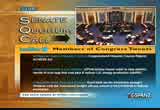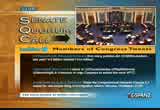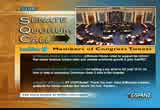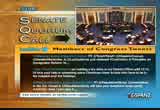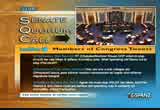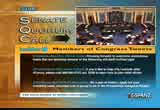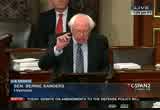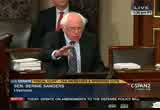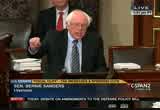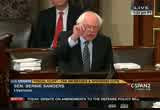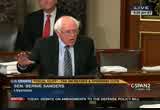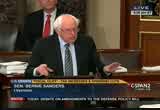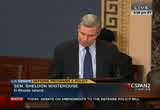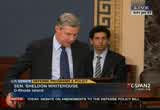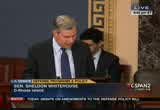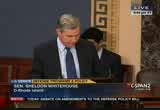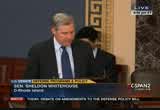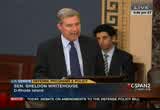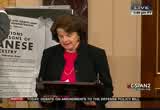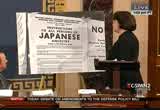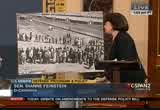tv U.S. Senate CSPAN November 28, 2012 12:00pm-5:00pm EST
12:00 pm
hope that we will get out of their way and let them do it. over the past ten years, the department of defense has invested significant time and resources into improving our nation's energy security. energy security is imperative to the success of today's military. which, by the way, uses 93% of the energy that's used by the federal government, which is the largest user of energy in this country. as our current chairman of the joint chiefs of staff, general dempsey, has said, without improving our energy security we are not merely standing still as a nation, we are falling behind. let's be clear. energy security is national security. and our military leadership understands this. other countries, including some of our strongest competitors, also understand this and we ignore this fact at our own peril. i saw some of the innovations that the navy has adopted
12:01 pm
earlier this year when i chaired a hearing for the energy subcommittee on water and power down in norfolk aboard the uss kersarge. the purpose was to highlight the advancements the navy continues to make in harnessing renewable energy resources. up with of those resources i saw is homegrown -- homegrown biofuels. and the navy recently demonstrated the capability of advanced biofuels during massive exercise that featured a carrier strike group, was highlighted by an f-18 traveling twice the speed of sound and a ship traveling at 50 knots, all being propelled on biofuels. as senator udall mentioned there have been two arguments about why we shouldn't be allowing the use of biofuels.
12:02 pm
the first is that energy investment should be handled by the department of energy and not the department of defense. well, energy security is going to require an all of government approach and that is currently the direction that we're going. as the largest fuel consumer in the world today and by far the largest in the u.s. government, as i said, 93%, the department of defense has a special role to play, and moreover, because of our dependence on foreign sources of energy we continually send our men and women in uniform in harm's way to maintain that access to oil. the second criticism we often hear is that biofuels are too expensive. now, it is true that advanced biofuels are not yet in full production and so they can't compete with oil, since the oil market is a hundred years old, but d.o.d. investment has caused the price to drop dramatically over the last two years, and
12:03 pm
biofuels are more immune from price shots than -- than oil. there are also significant costs to traditional foreign sources of energy that are not shown at the gas pump. those costs are associated with protecting our shipping lanes and oil supplies and for over 60 years we've been trolling the -- patrolling the persian gulf, these costs for oil remain underappreciated. for our military the issue of energy security investment in biofuels is simple. dependence on foreign oil is a strategic vulnerability. it creates problematic fluctuations in the defense budget and it puts our men and women in uniform at risk. we need to make sure that our military leaders are able to continue their historic tradition of identifying long-term challenges and seeking
12:04 pm
innovative ways to solve them. energy use is no different and nothing, including the congress, should get in the way. we shouldn't allow the debate over the military's energy use to become a proxy for other ideological debates around energy. we should let our military do be a what it does best. that is lead. thank you, mr. president. i yield the floor. the presiding officer: the senator from oklahoma. mr. inhofe: mr. president, i hear all the time on this floor about my good friend is -- is involved in this, in this rare case it's really true. the senator from colorado and i are very close friends and he and i disagree on this issue. i think it's important for us to understand where this came from. senator mccain and i are responsible for section 313, and i think when people understand what it is all these arguments i've heard against it none of them hold weight. what we're doing is trying to
12:05 pm
experiment in the green energy at the expense of our ability to defend america and our readiness. our military is deployed in more locations around the world at a greater operate-rate than was ever the case during the cold war. i sometimes say i look wistfully back on the days of the cold war. back then we had an enemy that we could define. he was an enemy was predictable. that's not the case anymore. after almost two decades of fighting all these contingents worldwide dlawg klug four major regional conflicts with a force structure that's 40% smaller and equipment that is decades older than the military readiness during its decline. this is what we're faced with right now and all is coming at a time when the obama administration has cut the defense budget, projecting over the ten-year period by some $487 billion and if the obama sequestration were to become a reality that would be a trillion dollars over this period of time coming out of our defense budget, even -- even the
12:06 pm
secretary of defense, the obama secretary of defense said it would be devastating. he used the word devastating. if that were not enough the obama administration continues to force the military to spend greater proportions of its already depleted funds on a gene energy agenda to include the purchase of biofuels for operational use in construction of commercial biofuel refineries. now, you know, i fully support development and use of alternative fuels including klug biofuels but not at the expense of the military. the focus should be on the readiness of the navy, not on propping up the biofuels industry. i have to remind everyone, we've a bureaucracy called the department of energy. they're the ones supposed to be doing all this experimentation we talk about. the navy according to the chief of a naval operations, admiral
12:07 pm
john greener will see a 15% increase in the number of ships and subs deployed with the number of ships in attack boats deployed at any time rising from 93 today to 107 by 2016. this increased deployment rate will impact sailors and marines as well as the required maintenance of ships and aircraft. the -- president obama talked about privetting to arab -- pivoting from asia. this will create another very serious problem. the -- when every defense dollar cut dollar degrades our military read nasa, why should we want -- readiness, why should we want the navy to pay four times for the fuel or in some cases 100 times the amount. where is the navy going to get additional funding to pay its biofuel bill? what is the navy willing to give
12:08 pm
up in order to pay this bill? what is d.o.d. willing to give up in order to pay the higher fuel bills? they've been talking about this on the other side. however the higher fuel bills is what this section 303 is all about. and we discussed this in the committee. i fully support the -- the efforts that -- make affordable and make sense but biofuels still face challenges in technologies that remain unproven. again, we've a department of energy that is supposed toking doing this. there was a 2011 and report --, rand report, there is no direct benefit to the department of defense and services from using alternative fuels rather than petroleum derived fuels. no in short, the military is best served at using efforts using energy more efficiently in
12:09 pm
weapons systems and military installations. that's a 2011 rand commission direct quote. despite the assertions that biofuels lobbyists, the two biofuel provisions in s. 3254, the national defense reauthorization act, for fiscal year 2013, do not restrict the department of defense from prxg of purchasing alternative fuels including biofuels. section 313 allows the continued use of the department of defense funding for -- of biofuels for testing, but precludes them from using the funds authorized for readiness and training. that's what this is all about, readiness. section 313 contained in the bill is intended to restore fiscal cliff responsibility and accountability for defense spending at a time when our nation simply cannot afford to waste taxpayers' funds on speculative green initiatives like solyndra and dozens of
12:10 pm
other companies that are floundering or bankrupt despite billions of government investment as they call it. a recent d.o.d. report revealed that the biofuels program will amount to an extra $1.8 billion a year in fuel costs for the navy alone. that's just the navy, not the air force, not the rest of it. now, this lewd crews price tag is not surprising through -- ludicrous price tag is not surprising. we found in 2009 -- listen this is significant. the navy paid an outrageous $424 a gallon for 20,000 gallons of renewable diesel and in december of 2011, the navy purchased 450,000 gallons of biofuel for $12 million equaling about $27 a gallon. that's $27 a gallon we're talking about in our defense budget that we're paying for something that should cost $3,
12:11 pm
maybe $4 a gallon. the navy is not the only service being sunld to this -- subjected to this greening agenda. last month the air force bought 11,000 gallons of alcohol to jet fuel at $59 a gallon, twice as much as per gallon as what the navy was forced to spend. we're talking about amendments like 400, 450, a gallon for fuel just to experiment and this is something the department of energy had been shb doing if anybody is going to be doing it. d.o.d. has been forced to drastically cut personnel and the number of brigade combat teams and airlift and has had to eliminate or postpone critical modernization programs. thanks to president obama, the defense budget cuts of d.o.d. can't afford to do business as usual, yet they are being coerced to spend $27 a gallon. secretary panetta has warned repeatedly president obama's
12:12 pm
deep cuts will have a deep effect to our economy. he used the word dwast stating. snowing this how could anyone support depleting another $1.8 billion from an already stretched budget? president obama's climate chief defended the green fleet by arguing even a dollar rise in gasoline prices would cost d.o.d. $30 billion. believe my good friend, the senator from colorado said essentially the same thing. i agree with that. if every $1 rise in gas prices cost $30 million, a $27 increase would add up to about $660 million so that argument falls completely flat in realizing the economic angle is a political hoozer the obama administration has tried to say
12:13 pm
it's about national security in getting off of foreign oil. that's where i want to get. i spent several years as chairman of the environment and public works committee and several years as the ranking member. all during that time people keep saying the one thing we all agree on is we need to be off of foreign oil. we need not to be dependent upon the middle east. and yet right now we know and no one is going to refute this fact, no one today, or in the future, that when we had the usgs report and the other reports saying that we now are in a different position than we've been before. we are not only -- we do not have only 2% as some people are saying, of the reserves in fossil fuels. i'm talking about coal, oil and gas. we are number one in the world now. we didn't used to be. two years ago we couldn't have said that. right now we are. we have the -- the opportunity and we can look at the
12:14 pm
opportunity in terms of our -- of our reserves that are usable of being totally self-sufficient. this is the thing so disturbing when people talk about they don't want to be dependent on the middle east therefore we have to spend billions of dollars of defense dollars to experiment on biofuels when had, in fact, we could be completely self-sufficient. all we have to do is what every other nation in the world does. every other nation in world they go after their own resources. so we have the recoverable reserves in gas and oil to take care of this country for the next 50 and 90 years respectfully, and yet we're trying to use this as an argument to go and spend this money on -- on experimental biofuels. so i think that part of the argument has -- has to be exposed for what it is. it's a phony argument. you know, we look and we see and people ask from around the
12:15 pm
country, they say why is it that your country, the united states, in my position on this committee, i have been asked this many times. why is it that you're the only country that won't exploit its own resources? and i say it's a political thing. and so right now if you really want to do something about becoming energy -- totally sufficient, i was asked the other day because the president keeps saying, well, you know, you're wrong because if we were to develop all of our public lands and be able to get the resources off of that, it would take ten years for that to reach the pump so i actually called up a man named harold hamm, he's testified before our committees up here in washington several times, i said, let me ask you a question. i'm going to be on a tv show tonight and they're going to ask me if the -- this administration would lift the -- all of the restrictions that we have on public lands, how long would it take for that -- each -- for the first barrel of oil that would come from that to reach the --
12:16 pm
the pumps? otherwise go through the refining process and all of that? because we've heard this administration say it would take ten years. well, in fact, it would take, his answer was -- and i said, be careful, harold hamm, because i'm going to use your name on nationwide tv. he said, yes, i've thought about this, it would take 70 days. not ten years but 70 days. so we're talking about sufficiency that we could have just in this country in a matter of days, not a matter of years. now, i only bring that up -- and i know that -- a lot of people don't think that should be a part of this debate but it is because they're using the argument that we have to spend billions of defense dollars in experimenting with biofuels to wean us off of fossil fuels when, in fact, that's fine, we're doing that right now and we have a department of energy that is responsible for the -- for actually carrying that out. the argument completely falls on its face. it was the u.s. geological
12:17 pm
survey report revealing that america has 26% of the world's recoverable conventional oil reserves and -- which is more than we're using, so we could be -- become independent. and almost 30% of the world's technically recoverable conventional natural gas resources. so with all of these things in mind, the congressional research service agrees, usgs agrees that we could become independent. so it all comes together. you know, this isn't happening in a vacuum. we've got a good bill here. we need to get it done in the short period of time that has been given us by the leadership and i think we can do. i agree with the chairman of the -- of the committee, that we can get this done. but this one amendment is one that would probably more than any other amendment take away our ability to spend this money on the readiness -- on the readiness, not the experimental program on green energy. with that,, mr. president, i would yield the floor and reserve the balance of my time.
12:18 pm
mr. levin levin: mr. president? the presiding officer: the senator from michigan. mr. levin: mr. president, i ask unanimous consent that at 2:00 p.m. today, the senate proceed to vote in relation to the udall amendment number 2985. further, there be no second-degree amendment in order to the amendment prior to the vote. the presiding officer: is there objection? without objection, so ordered. mr. wyden: mr. president? the presiding officer: the senator from oregon. mr. wyden: mr. president, i want to commend chairman levin, who has brought his usual thoughtful approach to these issues for his help specifically in two areas. i've been especially interested in. i also see my friend, senator mccain, on the floor. he and i have worked together often on these issues and other matters and i want to thank him for his wise counci counsel as . i ask unanimous consent that lieutenant colonel matt groves, a department of defense fellow assigned to my office, be granted floor privileges for the remainder of the date on s. 3254, the national defense authorization act. the presiding officer: without objection.
12:19 pm
mr. wyden: mr. president, as i indicated, i'm going to talk briefly on two amendments that i have a special interest in and the first is senator udall's amendment to strike section 313 of the bill. as a member of the senate committee on energy and natural resources, i have followed closely the proposition that the department of defense is the single largest user of energy in the united states and energy fuel expenditures in excess of $16 billion. this is an extraordinary thirst that the department of defense has for energy and it creates a host of issues for the pentagon and fluctuations in global energy prices can have dramatic, dramatic effects on defense spending. for every $10 increase in a barrel of oil it costs the american military annually an extra $1.3 billion. recognizing the potential instability that d.o.d.'s
12:20 pm
current energy needs can cause, military experts from across the various branches of the armed services have begun looking at ways to cut energy use and find energy alternative. now, i continued to hear all of this discussion about how this is somehow a green agenda and it's a suber havesive plot and it's being forced on a resistant president. and i just want to take a minute or two, mr. president, and say i don't think anything could be further from the truth and just wanted to describe for a moment why i feel that way. first, those who oppose defense energy initiatives often argue in today's fiscal environment, the country can't afford to waste money on energy programs when it's necessary to provide for our nation's security. i don't believe, mr. president, it is an either/or proposition,
12:21 pm
because my view is that an investment in energy efficiency and in energy self-sufficiency is hugely important to protecting our country's national security in a dangerous time. i've heard some argue that military research, development and testing of alternative to oil-based fuels is a misplacement of priorities, but this argument is based largely on the proposition that biofuels currently cost more per gallon than petroleum. but the reality is, is the makers of biofuels have not reached full-scale production and the department of defense contracts include research and development costs. so any attempt at a gallon-to-gallon analysis of biofuels versus petroleum is really what i would call an apples-to-oranges comparison. the fact is, mr. president,
12:22 pm
d.o.d. investments in biofuels development have resulted in a cost-per-gallon reduction -- a cost-per-gallon reduction of 94% in just the last three years. bloomberg new energy finance analysts predicted that some aviation biofuels will be cost competitive with standard jet fuel by 2018 given the continuation of current rates of development. so in about five years, the american biofuel industry could produce fuel for our military aircraft and vehicles at a cost equal to that of foreign oil. the truman national security project recently held a press call where you had retired generals talking, one in particular was quoted as saying, "moving away from oil ensures we remain the most capable and effective fighting force on the planet." that's what this is about. it's not about politics. it's not about saving polar
12:23 pm
bears. it's about being effective as an american fighting force. not my words, mr. president, the words of important retired generals. that's what this boils down to, in my view, mr. president, having the most effective fighting force and being in a position to save the lives of our service members. so i know there's going to be a fair amount of discussion throughout the debate on this bill about this issue, but i continue to believe that energy efficiency and energy self-sufficiency increase our national security. i hope my colleagues will support the pentagon's alternative energy efforts and vote for the udall amendment 2985. briefly, mr. president, i want to turn my attention to the other amendment that i have and again thank chairman levin and senator mccain for giving me this -- this opportunity to speak.
12:24 pm
mr. president, this morning the associated press reported that iraq war contractor kellogg, brown and root has sued the federal government to pay the $85 million in damages k.b.r. owes soldiers sickened because of k.b.r.'s negligence. this case started in 2003 when members of the oregon national guard were assigned to provide security for contractors from k.b.r. in iraq at the karmant ali water treatment facility. these soldiers and others were exposed to dangerous levels of chemicals, including sodium dichromate -- that hexovalient chromium, one of the most carcinogenic chemicals on earth. a group of the exposed soldiers sued k.b.r. based on the evidence indicating k.b.r. managers were aware of the presence of the dangerous chemicals but failed to warn the
12:25 pm
soldiers working in and around the plant. a jury recently agreed that k.b.r. was negligent and awarded the soldiers $85 million in damages. and more of the affected soldiers also have lawsuits pending so the damage awards, in my view, are likely to increase significantly. however, a recently declassified indemnification provision in the contract between k.b.r. and the u.s. military for work in iraq passed all financial liability for misconduct from k.b.r. to u.s. taxpayers, even in cases of -- and i want to emphasize this, mr. president -- even in cases of willful misconduct. willful misconduct by k.b.r. these provisions also provided for unlimited reimbursement of legal costs incurred by k.b.r. in effect, the company, k.b.r., was handed a blank check drawn on the american a taxpayer.
12:26 pm
and yesterday the company went to court to cash that check. my amendment would prevent d.o.d. from putting the american taxpayer on the hook for the negligence and misconduct of contractors without notifying congress. our soldiers know when they sign up that they're putting their life on the line, but they expect their commanders and the contractors working beside them to not expose them to unnecessary risk. both the d.o.d. inspector general and a jury have confirmed what oregon soldiers and i and other members of the oregon congressional delegation have been saying for years, that k.b.r. failed to protect our soldiers from a known threat. we can't know if the fact that k.b.r. had was a basic get-out-of-jail free card and it caused them to be negligent, but what we do know is we shouldn't let this happen again. my amendment was debated as part of the last d.o.d. authorization
12:27 pm
bill and my understanding is that it was actually acceptable to both sides. but we weren't able to get it into the final bill. i hope now, mr. president, especially in light of today's news right over the wire services this morning we can agree to include this amendment before more of our brave men and women in uniform are harmed by the actions of negligent contractors who then try to pass the buck to american taxpayers. mr. president, again, i want to thank the chairman and thank chairman levin and his staff for their help and i look forward to working with him particularly on this amendment here this afternoon. with that, mr. president, i yield the floor. ms. stabenow: mr. president? the presiding officer: the senator from michigan. ms. stabenow: thank you, mr. president. i rise to speak in favor of the udall amendment, of which i'm very pleased to be a cosponsor.
12:28 pm
i also want to start, though, by thanking our terrific chairman, we're so proud to have him from michigan, and distinguished ranking member for all of their hard work in putting together what is incredibly important 6 for our troops -- incredibly important for our troops and to support them for what they need and their families need and the tools for us to have a strong defense. part of having a strong defense is to make sure that we give the military the flexibility that they need and deserve to use the fuels that make sense for them and not to tie their hands for any reason. as we go forward, we know that there are opportunities to both save lives, save dollars by using a variety of rules. and this amendment, by striking language that stops the military from having that flexibility, i think is very, very important. we all know our dependence on oil has serious costs. we all know that.
12:29 pm
in terms of dollars. more importantly in terms of lives. one in every 50 convoys results in a u.s. casualty. we lose an american life in every 50 convoys. and since 2003, more than 3,000 troops have been killed in those attacks. now, most of the time, as we're moving troops, as the military leaders will tell you, they're -- they are moving fuel to be able to support the troops. so if we give opportunities, whether it's new kinds of hydrogen fuel cells or biofuels or advanced batteries -- there's a tremendous amount of work that's happening in michigan through tacom and tardac, which are the arms of the army that are doing the very important research and development of new technologies. they have now developed advanced battery technologies they're use not guilty the field that will save money and save -- they're
12:30 pm
using in the field that will save money and save lives. these are important things to be doing as we move forward to the future. the udall amendment would guarantee that we can continue to do that. the navy estimates that they spend about $84 billion -- $84 billion -- every year protecting oil supplies. think about that. not -- not in being able to do what we need to do on the frontlines in terms of defense but just protecting the oil supplies. shipping lanes, commercial vessels in the persian gulf region alone. this amendment again would save lives, save money, and it would allow the department of defense to move forward on these new technologies. hydrogen, e-85 and biofuel blends or flex fuel vehicles like the ones that we are building in michigan. these new technologies are our future. they are our future in jobs.
12:31 pm
they certainly are our future as it relates to saving dollars, getting us off of foreign oil, and as i said before, so importantly to our military and to all of us in saving american lives. the operational benefits of using different kinds of fuel are enormous. we have research going on in michigan right now, as i mentioned, around advanced batteries. i was pleased to be there at the launch of the first advanced battery jeeps going into the field, allowing those convoys of trucks to be brought down to a much smaller level, thus stopping the endangerment of thousands over the year, thousands of our troops. shorter supply lines means more flexibility for men and women in uniform and less danger for them on the front lines.
12:32 pm
so i strongly support the udall amendment. i'm pleased to be a cosponsor. this will give our military the flexibility they need to accomplish their mission. why in the world would we want to limit the flexibility of our military as they move forward to the next generation of new technologies to save dollars and lives? i strongly urge my colleagues to support the udall amendment. thank you, mr. president. the presiding officer: the senator from colorado. mr. udall: mr. president, i would ask unanimous consent that senators hagan, kerry, begich and franken be added to my amendment, numbered 2985. the presiding officer: without objection. mr. udall: mr. president, i believe we are reaching the end of our time designated to debate this amendment. the presiding officer: all the democratic time has expired. mr. udall: i would like to add a couple final remarks to the
12:33 pm
remarks i made earlier. i think we have heard a compelling reason to remove section 313 from the national defense authorization act, national security, energies security. let's stand with our military leadership, let's stand with our n.c.o.'s, let's stand with our enlisted personnel and ensure the military can continue to invest in this very important area of energy security which will save lives, create economic opportunity and make sure that we can project force abroad and protect the values we hold so dear. i urge my colleagues to vote for this amendment. i think at 2:00 we have a tentative agreement. with that, i would yield the floor. mr. levin: it's not a tentative agreement. there is a unanimous consent order that we're going to vote at 2:00, is that correct? the presiding officer: the senator is correct. mr. udall: i urge all my colleagues to support this amendment at 2:00 p.m.
12:34 pm
mr. mccain: inquiry of the chair, what are we waiting for? mr. levin: mr. president? the presiding officer: to get on the amendment offered by the senator from colorado. the senator from michigan. mr. levin: first, i would ask unanimous consent that my statements for the amendments be inserted into the record at this point. the presiding officer: without objection. mr. levin: secondly, i understand that senator baucus and senator march are on their -- senator murray are on their way and wish five minutes each to speak relative to this amendment. i would ask unanimous consent that between now and 1:00 that they -- that five minutes then be allocated to each of those two senators and that the amendment then still would be the pending amendment. i ask unanimous consent that we now proceed to the amendment of
12:35 pm
senator mccain, and when those two senators arrive and are recognized, that they be allowed to speak for five minutes each on the udall amendment. the presiding officer: is there objection to the request for extra time for senator baucus and senator murray? without objection. mr. levin: and i would ask unanimous consent that senator webb be added as a cosponsor to senator mccain's amendment that he's now going to offer? i didn't realize it was senator mccain's amendment. the presiding officer: is there objection? without objection, so ordered. mr. mccain: mr. president? the presiding officer: the senator from arizona. mr. mccain: i call up amendment numbered 3051 and ask its immediate consideration. the presiding officer: is there objection? without objection, the clerk will report. the clerk: the senator from arizona, mr. mccain, for himself and others proposes amendment numbered 3051. mr. mccain: i ask that further reading of the amendment be dispensed with.
12:36 pm
the presiding officer: without objection. mr. mccain: this amendment is to authorize additional marine corps personnel for the performance of security functions for the united states embassies, consulates and other diplomatic facilities abroad. the tragic events in benghazi on september 11 and the ongoing tumult throughout the middle east and north africa should serve as a stark reminder that the security environment confronting american personnel serving in the u.s. embassies and consulates abroad is as dangerous as any time that i can remember. despite claims by some, al qaeda and its affiliates remain dangerous and determined to kill americans. this reality must force us to reassess the threat to u.s. embassies and consulates around the world and provide additional resources in military end strength, that's u.s. marines, to increase protection of diplomatic personnel from those threats. this amendment will do that.
12:37 pm
it will provide the necessary end strength and resources to support an increase in marine corps security at u.s. consulates and embassies throughout the world. up to a thousand additional personnel. in particular, at locations identified by the secretary of state as in need of increased security in light of known and emerging threats to the united states personnel and property by terrorists. most americans believe that u.s. marines are stationed to protect our embassy personnel abroad, but i think they will be surprised to learn that marines are assigned in only slightly more than half of our diplomatic missions worldwide. 182 missions in 137 countries. moreover, their numbers are small. a typical detachment consists of only six military marine personnel. today, there are 126 u.s. diplomatic missions outside the united states without marine
12:38 pm
corps security protection, including parts of asia and africa, where we suspect that al qaeda is expanding its presence. as the nature of threats to american diplomatic personnel is changing, the marine corps security guard mission has not. the current mission of this program dates back to the post-war era of 1948. principally for the protection of classified information and equipment in diplomatic facilities. the marine security guard program is also the only marine corps program that is under the operational command of the department of state. for this reason, this amendment would also require the president to present discrete budget requests for marine corps security personnel overseas in support of diplomatic personnel and marine corps end strength and resources required to maintain readiness to protect our national security. these are distinct missions, and
12:39 pm
increasing one as is necessary in light of the attack at benghazi cannot come at the expense of another. americans may believe that our marines are the first line of defense in attacks on diplomatic compounds overseas. the truth is they are not. they are not mandated to engage with attackers and in some cases may not be permitted to engage. for this reason, this amendment calls on the department of defense to reassess this mission and rules of engagement as we increase our capability to protect embassies and consulates throughout the world. as the world now knows, there were no marine guards at the consulate in benghazi at the time of the september 11 attack. despite the rapid hi deteriorating security situation. would their presence have made a difference and saved the lives of our heroic ambassador and his security personnel?
12:40 pm
i think i know the answer to that question and so do the american people. so i think it's time that the administration should rapidly complete a reassessment to the risks of u.s. personnel conducting diplomacy abroad and others -- and all other 285 missions, not just 182, have adequate protection including by u.s. marines. i am not saying that this amendment requires that marine presence at every one of these missions. what we are saying is that as a result of the assessed risk assessments that we have sufficient authorization and appropriation for the adequate protection, part of which and a major part of it is the presence of the united states marine corps. i call on my colleagues to fulfill the mission of the
12:41 pm
marine security guard program to ensure that u.s. personnel are protected and authorize the necessary end strength and resources for the marine corps to achieve this necessary goal. i note the presence of senator murray, and at this time i would yield to senator murray. mrs. murray: mr. president? the presiding officer: the senator from washington. mrs. murray: thank you, mr. president, and i thank the senator from arizona for allowing me a few minutes to speak about an amendment that we are going to be voting on at 2:00. i want to express my concerns with provisions in the defense authorization bill that we are currently considering that would limit the department of defense in investing in alternative fuels. this underlying bill is a very important piece of legislation. i have always supported it to make sure our military has the equipment and resources and effective policies it needs to perform its missions, but i can't support the inclusion of provisions that would severely limit the department's ability
12:42 pm
to use alternative fuels. i strongly believe that those limitations will cause lasting harm to our national security and our military readiness and our efforts to decrease american dependence on foreign oil. so that is why i am -- that's why we are considering an amendment that i cosponsored that will strike one of those troubling provisions, that's section 313 of the committee-passed bill. mr. president, as many of our colleagues are aware of, d.o.d. is the single largest consumer of oil in the world, using over 355,000 barrels of oil per day in fiscal year 2011, and even though we have increased the domestic supply of traditional fossil fuels here in the united states, the price of oil is still set on the global market, and that means that d.o.d.'s fuel bill was significantly more than it had budgeted for, mostly, of course, due to the price of fuel being higher than expected. in fact, in fiscal year 2012,
12:43 pm
the navy alone was $500 million over its budget for fuel, and that's just one of our services. so what does that mean? well, it means that our military leaders have had to pull billions of dollars from operational accounts in recent years, which has led to decreased unit readiness, deferred maintenance on some of their critical equipment and less training for our troops who are preparing for deployment into harm's way. conveniently, critic of biofuels leave out these very real threats when they insist on the kinds of harmful policies that the amendment that we're offering addresses. now, mr. president, it is true that alternative fuels will not replace fossil fuels in the immediate future, but it's also true that replacing even a fraction of the oil consumed by the department of defense with domestic alternative fuels will advance our national security and our military readiness. it will save many millions of dollars. it will protect the department from the price volatility of the
12:44 pm
global oil market and spur a domestic industry that will decrease our dependence on foreign oil. now, some of our colleagues have said that this is all about the cost of alternative fuel and they will likely use some misleading figures attributed to a training exercise that actually, by the way, ended up proving these types of fuels work seamlessly, but the truth is the cost of biofuels has decreased by over 50% in the last two years alone. the truth is that the test fuel purchase they like to mention was only .3% of the navy's annual fuel bill, and the truth is that those concerns over cost don't take into account the very real and very high price of an action and continued dependence on oil. now, earlier i mentioned the department uses 355,000 barrels of oil every day. the department estimates that for every 25-cent increase in
12:45 pm
the price of a gallon of oil, it will spend over $1 billion in additional fuel costs. $1 billion. given the high price of oil and gas, that's not a bet i want to make long term. we are facing difficult fiscal times, as everyone here knows, and the department of defense, like the rest of the federal government, has to make sure it is responsibly spending taxpayer dollars today and tomorrow. the department's efforts to develop alternative fuels is in keeping with the best traditions of military technology programs. in the past, programs have brought us products that have benefited both d.o.d. and the civilian users like the g.p.s. or jet engine or microwaves or even cell phones. our navy pioneered the transition from sail to coal, from coal to oil, and from oil to nuclear power. i know we can make the next leap to alternative fuels and we need to. our nation's reliance on foreign oil is significant and well
12:46 pm
recognized military vulnerability. our military leaders are telling us the ability to use fuels other than petroleum is critical to our national energy security. the department is strongly opposed to the language limited its flexibility in the committee-passed bill and d.o.d. supports our amendment. so, mr. president, i urge our colleagues to join us in supporting the amendment that we will be voting on shortly and strike this troubling provision. thank you and i yield the floor. the presiding officer: the senator from arizona. mr. mccain: be added as cosponsors to my amendment 3051, senators inhofe, ayotte, brown of massachusetts and webb. the presiding officer: is there objection? without objection, so ordered. a senator: mr. president? the presiding officer: the senator from michigan. mr. levin: i ask unanimous consent that senator boxer also be allocated five minutes to
12:47 pm
speak on the pending amendment. the presiding officer: is there objection? the senator from arizona. mr. mccain: are we going to the voice vote at this time before -- mr. levin: could i ask the senator frommen montana, he wishes to speak on the udall amendment? mr. baucus: yes. mr. levin: i ask there be no further debate -- you're not ready? okay. mr. baucus: mr. president? the presiding officer: the senator from montana. mr. baucus: i thank my good friend from michigan and arizona for their gracious willingness to provide an opportunity for me to make a brief statement. mr. president, i am in strong support of the amendment to protect the military's ability
12:48 pm
to purchase american-made fuels. powering our military with american military makes our country safer and our economy stronger. tying our hands and forcing the american military to depend on foreign oil is shortsighted and it's dangerous. instead, we need to give our commanders the flexibility to power, with homegrown energy like those that support jobs in america. the department of defense is the largest single user of oil in the world consuming more than 355,000 barrels of oil per day last year. despite increased domestic production of fossil fuels, rising global prices and market volatility caused the d.o.d.'s fuel bill to rise by more than $19 billion in 2011, and that trend is expected to continue. that's why i support the efforts of our military leaders -- that's what they want -- to
12:49 pm
develop and employ alternative fuels. our military leaders recognize the costs of dependence on foreign oil. the air force has established a goal of purchasing half of its domestically consumed aviation fuel from alternative sources by the end of 2016. and the navy is also invested in the f-18 greenhorn it program a fighter jet powered by a biofuel blend. the department relies on a sustainable biofuel market to meet its goal of lessening dependence on foreign oil. it's very important to the pentagon. regrettably, a provision in the underlying bill will limit the military's ability to develop alternative fuels. members on bowles-simpson are -- both sides of the aisle are concerned that this section would cause harm to our national security and military readiness.
12:50 pm
that's why i am fighting to allow the pentagon to enter into long-term deals, to buy biofuels as long as they're made right here in the united states. montana is in a perfect position to provide the homegrown fuels our nation needs to move towards energy security. there is clearly a demand from both the military and the private sector to use american-made biofuels. in 2011, the navy, the department of energy, and the department of agriculture aimed to assist the development in support of sustainable commercial biofuels industry. they investigated the investment as alternatives to diesel and jet fuels. it included montana farmerring corporations, it would be detrimental to montana's alternative fuel industry. as a result, investing in biofuels, renewable crops have been used by military as the
12:51 pm
predominant feedstock for biofuel plants. i call these freedom fuels. why? because they help get us off the foreign oil and help bring good-paying jobs to montana. researchers at montana state university at vaver, montana, so camplinea is a promising proper kropf. also known as gold of pleasure is an oil seed crop that includes canola, mustard and broccoli. it's been grown in europe and the northern plains of the united states. since its initial production, the cost has dropped annually by half. every year it drops by 50%. another reason why i think it makes sense to ramp up our domestic energy production whether it's biofuels, wind,
12:52 pm
coal, natural gas or hydropower. we need an energy power that puts america back in control. we must reduce our dependence on foreign oil and work to develop all of our domestic resources just like we have in my state of montana. alternative fuels will not replace fossil fuels altogether. no way. however, replacing even a small fraction of fuel consumed by our military with alternative fuels made here in the united states can improve strategic flexibility, insulate the defense budget from spikes in the cost of follow of fossil fuels, create good-paying jobs for americans and make the united states is a more secure nation. mr. president, i yield the floor.
12:53 pm
the presiding officer: the senator from michigan. mr. levin: mr. president, i ask unanimous consent senator boxer be allocated five minutes of debate on the udall amendment. the presiding officer: is there objection? mr. levin: and we are waiting to -- just for one further word on the mccain amendment, we hope to be able to voice vote that this the next few minutes. the presiding officer: on the matter of senator boxer, without objection. mr. levin: i note the absence of a quorum -- we're good to go. i withdraw that request. i, mr. president, support the mccain amendment and ask my statement be made part of the record. the presiding officer: without objection. any further debate? hearing none, all those in
12:54 pm
12:55 pm
1:05 pm
1:06 pm
1:08 pm
mr. nelson: mr. president? mr. president? the presiding officer: the senator from florida is recognized. mr. nelson: i ask consent that the quorum call be lifted. the presiding officer: without objection. mr. nelson: mr. president, while we're waiting for further debate on the defense bill and any possible amendments, i wanted to offer a couple of comments as to all of the concern in the nation about the fiscal cliff and as we approach that fateful day of december the 31st, the need to get something done. in this senator's opinion, sequestration, which is this
1:09 pm
additional cut of a trillion dollars in a most unorthodox w way, it's like a meat cleaver coming down and cutting off -- i'm rounding here -- a half a trillion off of defense and a half a trillion off of non-defense discretionary. sequestration, let's remember in the historical context, was never supposed to happen. sequestration was a mechanism that was set up in the budget control act in august of 2011 -- almost a year and a half ago -- after the agreement, the act called for $1 trillion being cut off of the top to begin with and it set up a process by which
1:10 pm
additional deficit reduction over a ten-year period would occur. and that process was after the trillion dollars was whacked off -- which it already has be been -- that a super committee of six from the house and six from the senate would deliberate and a majority vote of that committee of 12 could determine additional deficit reduction that would apply over the next ten years. and to give a little incentive for that super committee not to deadlock, the process of sequestration was set up which, in effect, was this meat cleaver that in a nondiscriminate way
1:11 pm
was going to drop a meat ax approach of another half trillion out of defense and a half trillion out of non-defense discretionary, which nobody wanted. and of which was never contemplated that it was going to go into effect, because the effects were going to be so onerous that surely people of goodwill could come together on a 12-member committee and not deadlock but instead at least one would provide the majority, even if it were only 7-5 out of the 12, because the alternative was so unpalatable. and, of course, we know what happened, that people of
1:12 pm
goodwill in this atmosphere highly charged of the coming presidential election -- this is almost a year and a half ago -- that the ugly head of excessive partisanship raised its head and the ugly head of excessive ideological rigidity raised its head and the super committee deadlocked 6-6 which under the law left the meat cleaver to drop. the budget meat ax to drop. and that's what we're facing. we're facing something that nobody ever intended to go into effect. so how do we get out of this? we have people of goodwill that have to be reasonable and utilize a little commonsense, lessen their partisanship,
1:13 pm
lessen their ideological rigi rigidity, and that's the atmosphere that we can come together in. now, i want to tell a story and then i'm going to sit down, mr. president. i want to tell you the story about one of the brightest shining moments in government occurred back in 1983 when this senator was air youn was a youn. we were within six months of social security running out of money. and two old irishmen -- one who was president, his name was reagan; and the other one who was speaker, and his name was o'neill -- decided that they were going to do something about this. they were reasonable people who could operate in a bipartisan way and a nonideological way. and they said, what we're going
1:14 pm
to do is take this subject that is so thorny -- namely, social security -- so thorny at the time of elections and we're going to take it off the table at the next election to use it as a ham to her beat your oh pony -- as a hammer to beat your opponent over the head with, and we're going to do it in the mechanism of a blue-ribbon panel that is going to maybe recommendations on the solvency of social security. that committee met. they reported it to the congress in a bipartisan way. the congress passed that recommendation overwhelmingly. the president signed it into law and that made social security solvent for the next 50 years-plus, from 1983. i think the most current
1:15 pm
estimates are that it's now something like 2034. and so you see what was done so effectively. but you have to have people of goodwill that will come together and will do so with some common sense, which is what this place has not been operating on in a long while. mr. president, i wanted to share that memory of one of the great moments of government working as our government is intended to work. and so with that, mr. president, i yield the floor, i suggest the absence of a quorum. the presiding officer: the clerk will call the roll. quorum call:
1:20 pm
1:21 pm
senate is in a quorum call. mrs. gillibrand: i request that we suspend with the quorum call. the presiding officer: without objection. mrs. gillibrand: i rise today to speak on behalf of the approximately 20,000 military families whose loved ones are on the autism spectrum. sadly, thousands of these americans suffering from autism are not receiving the treatment that are the best practices that have been determined that they need. these military families are receiving fewer services than their civilian government counterparts across the country, many of whom have been rightly aided by laws passed in over 60% of our states, representing over 75% of the country's population. autism places tremendous strain on our nation's military families and nonmilitary families, including tremendous health, financial and emotional tolls. i want to share with you briefly
1:22 pm
just a couple of stories from our brave military families. one veteran was severely wounded in iraq while heroically serving our country. his injuries forced him to medically retire. because he is retired, his autistic son shane was no longer eligible to receive the a.d.a. services that he had previously received. the wait list for medicaid waiver services is over nine years. shane's family had to sell their home to pay the roughly $5,000 per month of out-of-pocket expenses that the a.d.a. treatments require that he so desperately needs. the money is running out for their family, and their family's effort is only to do what's best for their son. without any relief, we risk allowing brave military families just like this one to fall through the cracks. another active duty marine who served in iraq and afghanistan
1:23 pm
three times has maxed out his therapy treatments to treat his 11-year-old autistic son joshua. joshua is in nonverbal and so safety is a key concern. joshua is prescribed 35 hours of these a.b.a. therapy treatments each week. due to the severity of joshua's symptoms, the family is faced with the nearly impossible decision of foregoing the recommended care for their son or paying the bills out of pocket as long as they are able to. in my opinion -- and it's shared by many, many families -- this should never happen to any child but it should also particularly not happen to the child of someone from our military service. that's why i am introducing an amendment requiring tricare to cover medically recommended autism treatments including the a.b.a. therapy in a manner that is consistent with the best practices so that our military families, our heroes get the
1:24 pm
care that they need for their children, children like shane and joshua. every parent who has a child with autism faces challenges to ensuring that their child has access to the treatments that they desperately need. for military families, these challenges are often compounded by frequent deployments overseas, frequent movements to different bases across state lines and sometimes gaps in coverage. today, tricare coverage of a.b.a. is severely limited. it's capped at $36,000 per year for an active duty service member. this falls far below what's medically recommended. this care is limited to active duty service members only. guard and reserve families receive intermittent care and children of retirees cannot get any coverage at all. as a consequence, military service members must often turn to state-run medicaid programs to help their children, but these programs are often unavoidable -- or unavailable to
1:25 pm
a mobile military family because of the extensive wait lists. in maryland, for example, the wait is seven years long, essentially eliminating a.b.a. coverage during the early developmental years when a child needs it the most. the wait list in virginia, for example, is over ten years long. even more remarkable than tricare not covering these treatments is that the office of personnel management has already determined that such treatments may be covered as medical therapies for federal civilian employees. a recent court decision which d.o.d. is still reviewing and may appeal determined that tricare must cover these treatments but this decision is being applied under the most narrow definition in the interim, limiting the potential pool of providers. now, this amendment basically requires tricare to provide the coverage and deliver services in a manner that's just consistent with best practices. this would thereby improve our access for our military families, and it would finally
1:26 pm
align tricare with the other types of coverage that's available in civilian sectors. we have a duty to stand by our military families and address this very difficult health issue that affects their children. when we ask our men and women to serve, we promise that we will support them and their families. this amendment simply fulfills that promise. mr. president, i also rise to speak about another issue concerning the armed services authorization bill, and this is equally as serious and troublesome, and that's the issue of sexual violence. well, the -- while the vast majority of our service members serve our country honorably and bravely and are simply the best our country has to offer, sexual violence in the military continues to occur at an alarming rate. by a minority of service members who should not be serving.
1:27 pm
despite secretary panetta's efforts to create a zero tolerance policy in 2011, still more than 3,000 military sexual assaults were reported, but the d.o.d.'s estimates themselves think the number is much closer to 19,000 cases. in the words of the d.o.d. -- quote -- "sexual violence in the military is an affront to the basic american values we defend and may degrade military readiness, subvert strategic goodwill, and forever change the lives of victims and their families." all of our service branches have in place some version of a policy that sends convicted sex offenders to an administrative separation process for discharge. however, the most recent annual report on sexual assault in the military shows that in fiscal year 2011, 36% of convicted sexual offenders remained in the armed services despite these policies. in one-third of convicted sex
1:28 pm
offenders within the military are being retained, then clearly we must do better. creating a uniform standard to correct deficiencies in the respective branch policies would be a good step forward. experts reviewing current policies have found that the navy has established a mandatory policy that calls for administrative discharge of any personnel who are convicted of a sexual offense. my amendment would require the department to oversee that each of the service branches establish policies that would mandate service members of sex offense to be processed for administrative separation. this means that each such perpetrator would get due process but that the process would be required. this amendment is common sense and it's one that would strengthen the policies that the services have actually already put in place and reinforce d.o.d.'s zero tolerance policy.
1:29 pm
1:31 pm
a senator: mr. president? the presiding officer: the senator from maryland. mr. cardin: i ask unanimous consent the quorum call be dispensed with. the presiding officer: without objection. mr. mr. cardin: this is a bittersweet moment. i ask to speak as if in morning business. the presiding officer: without objection. mr. cardin: i rise to give
1:32 pm
attention to my director, who is retiring. it is with deep appreciation i say could be to bailey who in 1982 ran my reelection campaign to the maryland house of delegates, served as my campaign aide during my first congressional race in 1986, as my district director for 20 years and finally as my state director during my first term in the united states senate. over the years, bailey has been a friend to my entire family, a trusted confidante, a reliable sounding board for my legislative district and statewide agendas. for more than three decades, i have been truly fortunate to have her at my side providing knowledgeable advice and a commonsense approach to many issues that face members of the house and senate. bailey is a people person, who understands how to work in washington affects the everyday
1:33 pm
lives of marylanders, and she regularly reminds my staff and me of that fact. bailey's knowledge of baltimore and maryland is unparalleled. she grew up in northern virginia but settled in baltimore in 1970 where she worked first for the housing commissioner and later for the late mayor william donald chafer. during her years handling projects for the mayor, bailey developed a deep love for baltimore city and a true understanding how baltimore works. bailey became a creative genius at promoting and highlighting the many achievements of the city under mayor schaefer. before mayor schaefer left city hall, he nominated bailey to serve as president of the baltimore city school board. in that role she helped parents and a navigate the school bureaucracy, suggested workable solutions for teachers and brought a commonsense approach to the baltimore city school system. but bailey's knowledge and
1:34 pm
expertise goes beyond knowing how government works. she has had her pulse on baltimore and on maryland. she knows the key players this the city and state, many on a personal level. for many years bailey has been the go-to person when people need to get things done. without a doubt she has been an invaluable resource to my entire staff, to me and the people of maryland. but she is also a tireless advocate and a voice for families and individuals who may not have had the understanding or resources to access the services they need. what whether it's working with the mayor of oakland when spring floods threatened the dam near the town or getting services for a homeless veteran or working with community groups to improve their schools, bailey is a relentless public servant. there also is no deputying her energy and enthusiasm are unstoppable, unsurpassed and that her retirement will leave a real void. through her efforts so many people have been connected to
1:35 pm
jobs, affordable housing, quality health care, or government benefits. so many of these people have benefited from her advocacy their lives have been changed for the better, and most of them will never know her name. to me, that is the highest form of public service. i ask my senate colleagues to recognize the many contributions bailey has made and the example she has set for public service. i also want to take this opportunity to thank bailey's family, her husband stanley, her children michael and laura, for their support and understanding as bailey has worked to help others. today is bailey and stanley's 41st wedding anniversary. on december 8, laura will be married. please join me in wishing balely fine a healthy and happy retirement and well deserved time with her family. mr. president, i ask unanimous consent floor privileges be granted to ann wide lee during the senate consideration of s. 3254, the national defense
1:36 pm
1:44 pm
the presiding officer: the senator from virginia is recognized. mr. webb: thank you, mr. president. i -- i ask unanimous consent that the quorum call be vitiated. the presiding officer: without objection. mr. webb: i'd like to speak on the udall amendment. i have great admiration and respect for the senator from colorado, as well as his cousin who now presides, but i have concerns about this amendment that were raised during the
1:45 pm
committee markup and i think have become even more of concern since that time period. and let me just begin by saying as someone who spent five years in the pentagon, one as a marine and four as a defense executive, i would hope that the top order of business for our president as he begins his next term would be to call for a reexamination, a rigorous reexamination of all of the programs in the department of defense. in other words, not quite to zero base them but to really examine the justification for all of the programs that are in place with an eye toward the realities of the future. i think we could benefit as a country and the people who care about national security but also care about the tax bills they
1:46 pm
are getting would benefit as well from something of a triage of the programs in the department of defense. we should ask the secretary of defense and the people who work with these programs to examine which programs in d.o.d. are the must haves, which are absolutely vital to our national security, and which programs are the need-to-have, the programs that might place our national security at some level of risk if they were to be altered and modified, and then also to have some painful examinations of programs that might be called the nice-to-haves, those that are essentially ancillary to the harder definitions of national security, even though they have been supported. and i would say that these -- the costly biofuels programs in
1:47 pm
the sense that we are proposing to fund them in the operational environment at this time would have to qualify as a nice-to-have. that does not mean that we should eliminate the biofuels. there is money in r&d to continue to examine them. but i tell you, mr. president, what a must have is. a must have is our ship-building program. when i was commissioned i in the united states marine core, we'd 900 ships in the united states november . by the time we went into the post-vietnam draw had downs, we had 479 combatants. when i was secretary of the navy in 1987-1988 we were able to rebuild the navy up to 568 combat tant of the since that time, national strategy has changed, our commitments has changed. but the size of the navy has been dramatically reduced down to the point where today it's about 285 operational combatant
1:48 pm
ivessels. we've been trying since came to the senate to rebuild the navy up to a minimum of 313 combatants. it's very difficult to do this when you have other programs in place that are not directly contributing to our national security but are competing for programs. i understand the concerns about energy independence. i also would like to remind my colleagues of the advances that we have made in this country in that area just over the past few years, in a way that many of us could not have imagined six years ago when i came to the senate. the international energy agency just made a report called "world energy outlook" and in this report is summarized -- as summarized by reuters, the united states, according to their estimates, will overtake saudi arabia and russia as the
1:49 pm
world's top oil producer by 02017. beneficiary by 2017. the i.e.a. chief economist told a news conference in london that he believed the united states would overtake russia as the biggest gas producer by a significant margin by 2015 and by 2017 would become the world's largest oil producer producer. will this prediction hold out? i don't know. but are we on our way towards significant gains in terms of our energy independence? yes, we are. the language in section 313, which this amendment proposes to strike -- i want to be very clear about this -- does not affect programs that have been discussed here in such areas as hydrogen fuel as a fuel of choice for engine design or doing away with r&d dollars. it is just not true. it states in part that this
1:50 pm
restriction goes to the cost of producing or purchasing alter national fuels if they exceed the cost of producing traditional fossil fuel that would be used for the same purpose -- that's very narrowly defined. there is a second paragraph in section 313 that goes to an exception to this program, which only applies to 50/50 blends of fuels. i personally believe that section should be modified and actually could be modified in conference. it's -- i think it's too nature roy. -- i think it's too narrow. but in general this is not a paragraph that totally does away with the biofuels program in the department of defense. we have to make decisions. we have to get competitive programs into the department of defense. we must increase the readiness. we are not proposing to decrease
1:51 pm
the research and development programs. for those reasons, i will be opposing this amendment with the hope that we can continue the r&d programs for biofuels. with that, i yield the floor. the presiding officer: the senator from california. mrs. boxer: mr. president, i'm going to be very proud to support amendment 2985. i think it has to do with our military readiness. i think it has to do with our national security. and i think the fact that we have this opportunity is commendable, and i want to thank senator udall for it. striking section 313 is important because that section harms d.o.d.'s ability to diversify its fuel supplies by developing and using effective alternative fuels. now, you know, lots of
1:52 pm
colleagues can come down here and proclaim thi this isn't important or it is important. you know what? i want to listen to the d.o.d. themselves and what they say. there was an armed forces press service news report in july 2012. and this is what they said: and i quote -- "smart investing and less reliance on petroleum-based fuels will help ensure an agile, lethal and adaptable combat force and ultimately national security. " so, mr. president -- mr. president, i was distraught when i heard that the armed services committee by one vote put in this section that would stop the ability of the d.o.d. to invest in these very important fuels so they can have an agile, lethal, and adaptable combat force, and ultimately national security. now, this is coming -- word from the d.o.d.
1:53 pm
why on earth would anyone support something that the d.o.d. tried to take away the -- or tried to take away the ability of the d.o.d. to have an agile force? i don't understand it. i can't understand it. the report also quotes assistant secretary of defense sharon burke who said, "the department is going to have ships, planes, and vehicles that were designed to use petroleum fuels for a very long time. it ensures that our equipment can operate on a wide range of fuels and that's important for our readiness over the long term." mr. president, how many wars do we have to have over oil? how many wars do we have to have over oil? i can tell you a story from a colleague of mine who said that he went up to the white house when george w. bush was
1:54 pm
president, before the iraq war, and george w. bush had pictures of all the oil wells in iraq. and if anyone says that there was no connection to oil and that war, i would say, you're wrong. and i have met with many veterans who say the same thing. they don't want to go in and fight and die for oil. so this is of critical importance, this vote. there's no more important admission for the department of defense than to fight and win battles needed to defend our nation, return or troops home safely to their families and section 313 could undercut the department of defense's ability to achieve these goals. in a letter to senator udall, a
1:55 pm
vice admiral said, "section 313, that's the section we're trying to strike, is overly broad. it has the potential to restrict investments that would address tactical and operational needs for our native. he as i said says, as fuel technologies advance, the navy may wish to test and certify multiple types of alternative fuel including some that might be 100% alternative fuel, not a blend. why would anyone in this united states senate want to stop us from developing alternative fuels? i don't get it. we're trying so hard to become energy-independent. we've made great success under our president obama. with fuel economy in place, investment of alternative energy, the military says it's important for them to ensure an agile, lethal, and adaptable
1:56 pm
combat force and ultimately national security. their words. so in addition to everything else, this is a need that the military has definitely outlined for us. a statement of administration policy on the house defense authorization bill, which contains a nearly identical provision, says that affecting d.o.d.'s ability to procure alternative fuels in this way -- quote -- "would further increase america's reliance on fossil fuels, thereby contributing to geopolitical instability and endangering our interests abroad." mr. president, some of the same people who call for boycotts on iran, which i support, somehow feel it's not important for us to be free from reliance on those kinds of countries for our
1:57 pm
oil. it makes no sense. you can't make these compartme compartments. you're going after countries that have oil and you're right to do it because they're dangerous, many of them. we're embargoing -- we have embargoes on many of them. we have sanctions on many of them. and at the same time with the other hand you're saying to the d.o.d., forget about alternative fuels. it makes no sense from a national security perspective. in addition to harming the military's ability to achieve its goals that i've outlined here that were written very, very clearly by the defense department itself, section 313 precludes research into fuels such as hydrogen, which has the potential to power some military vehicles over much longer missions. you know, i've been around a while. something tells me, is big oil calling the shots here?
1:58 pm
i would hope not. but i don't understand why this section, which senator udall is trying to strike, is in this bill when the military says it is critical for them to continue this program. the section could also prevent d.o.d. from purchasing fuels that are sold today in the u.s. of a., sufficient as e-85, which is 85% ethanol. the department of defense has flex-fuel vehicles in its fleet. can you imagine? going after that as well. it would restrict d.o.d.'s efforts to develop technologies to develop fuel in tact tactical low cakelowlocations. i really want to thank senator udall for bringing this to our attention. this is a very important
1:59 pm
amendment. perhaps one of the most important i have voted on in a long time. and i will -- i will close by saying this: if you believe that this country should be energy-independent, then vote with senator udall. if you believe it is dangerous for us to rely on oil from countries who really want to cause us harm, then you should support the udall amendment. if you believe it's good for our health, our environment to invest in alternative energy, then vote for the udall amendment. it is a win-win-win, and most of all, the military tells us we should continue this program. it's important so that we have an agile, adaptable force and it's important for our national security. so i will be proud to vote for this amendment. i would yield the floor. i would note the absence of a quorum. the presiding officer: the clerk will call the roll.
2:00 pm
quorum quorum. mr. udall: mr. president? the presiding officer: the senator from colorado. mr. udall: i'd ask that the quorum call be lifted. the presiding officer: without objection. mr. udall: mr. president, i ask unanimous consent that senators baucus, coons, mr. brown of ohio, lieberman, stabenow, cantwell, schumer, durbin, mr. johnson of south dakota, bennet, blumenthal, whitehouse, and collins be add as cosponsors to my amendment number 2985. the presiding officer: without objection, so ordered. mr. udall:man, i yield the floor. -- mr. president, i yield the floor and note the absence of a quorum. the presiding officer: the clerk will call the roll. quorum call: quorum call:
2:01 pm
2:33 pm
the presiding officer: are there any other senators in the chamber who desire to vote or to change their vote? if not, the yeas are 62, the nays are 37. the amendment is agreed to. a senator: i move to reconsider. the presiding officer: without objection, so ordered. the senator from michigan is recognized. mr. levin: mr. president, i would now ask unanimous consent that we proceed to consideration of an amendment by -- amendment numbered 3016 of senator gillibrand. the presiding officer: is there objection? without objection. the clerk will report the
2:34 pm
amendment. mr. levin: i was going to add something further to the request. and that there be five minutes of debate on the gillibrand amendment and that then senator mikulski be recognized to speak as though in morning business for five minutes. the presiding officer: is there objection? without objection, so ordered. a senator: mr. president? can i make a unanimous consent request? the presiding officer: the senator will suspend for a moment. the senator will suspend. one second. the senator from missouri. mr. blunt: i have a unanimous consent request that my defense fellow mr. mark o'neill be allowed access to the senate floor for as long as the defense
2:35 pm
authorization bill is being considered and a unanimous consent request from senator cochran that karen occurrington and mike hansen, legislative fellows on appropriations and taylor lamb, a fellow in senator cochran's office be granted floor privileges during the consideration of the national defense authorization act for f.y. 2013. the presiding officer: without objection, so ordered. mr. blunt: thank you. the senator from new york is recognized. mrs. gillibrand: i request that my amendment be called up. the presiding officer: the clerk will report. the clerk: the senator from new york, mrs. gillibrand, for herself and others, proposes an amendment numbered 3016, on page page 138, strike lines 14-20 and insert the following -- 8, a requirement that each secretary -- mrs. gillibrand: i request that the reading be vitiated. the presiding officer: without objection, so ordered. the senator from new york is recognized. mrs. gillibrand: mr. president, i rise to talk about an amendment that i believe is an
2:36 pm
urgent -- the presiding officer: the senator will suspend for one second. the senate will be in order. the senator will suspend. the senator from new york is recognized. mrs. gillibrand: thank you, mr. president. i rise to speak to an issue that is incredibly urgent. today, the vast majority, almost all of our service members, serve this country so honorably, so bravely, but there is a very small number who do not who are engaging in sexual assault in the military. despite secretary panetta's effort to have a zero tolerance policy in this country, in 2011 alone, there were 3,000 military assaults reported, and the department of defense estimated that the real figure is much closer to 19,000 assaults. in the words of the d.o.d., the sexual assault to the military is an affront to our basic
2:37 pm
american values and it degrades our readiness, it subverts our strategic goodwill and it forever changes the lives of victims and their families. so my amendment is very simple. today, each of the services have policies that address this issue, but the one that the navy has is the best, so what my amendment does is it requires the department to oversee that each of the service branches establish a policy that would mandate that service members convicted of sexual offense will be processed for administrative separation. the reason why this is so important, mr. president, is because one-third of convicted sexual offenders in the military are still retained, they are still serving, so obviously we must do better. we need a uniform standard to correct these deficiencies in the respective branch policies to be able to serve our military families and our military members as we should.
2:38 pm
i yield the floor. the presiding officer: the senator from michigan. mr. levin: mr. president, -- further debate on the gillibrand amendment. mrs. gillibrand: i would like to say that senator collins and senator snowe are cosponsors of this amendment. i know they have statements for the record that they will be submitting later. mr. levin: i ask consent then that those statements be inserted in the record at the appropriate time. the presiding officer: without objection, so ordered. mr. levin: madam president, we have no further debate on the gillibrand amendment. the presiding officer: if there is no further debate, the question is on the adoption of the amendment. 3016. all in favor signify by saying aye. opposed nay. the ayes have it. the amendment is agreed to. mr. levin: i move to reconsider. the presiding officer: without objection, so ordered. mr. levin: now, mr. president, i
2:39 pm
understand under the current unanimous consent agreement that the senator from maryland is going to be recognized for five minutes as though in morning business. the presiding officer: the senator is correct. the senator from maryland is recognized. ms. mikulski: mr. president, i'm not going to linger on the field or the floor because there is much to be discussed on the defense authorization, but what i wish to talk about for a few minutes is about the safety and security of the united states of america, meaning our solvency and the demonstration of our ability to govern. mr. president, i know there is much negotiation going on, but could i be heard? the presiding officer: the senator will suspend. the senate will be in order. if you could clear the center aisle, please.
2:40 pm
ms. mikulski: mr. president, i understand my colleagues have very strong feelings about some of these amendments and wish to negotiate. i just want to be able to say this -- mr. president, i rise to say we need a sense of urgency about solving the fiscal cliff. we need to end the culture of delay in this institution. i'm very concerned that as we talk about solving the problems of the fiscal cliff, there is this whole dynamic going on, there is this whole patina going on, there is this whole from staff level to senators, it's oh, we're going to be here until christmas eve. i think that is a disaster. i think it's a disaster for our economy. i think it's a disaster for our demonstration of our ability to govern, and i think it's a disaster for our standing in the world. we need to show that we can
2:41 pm
govern ourselves and we can put ourselves on a sound fiscal path with the right combination of growth, frugality and ensuring a safety net to the most vulnerable of our citizens. so i am here to say to my colleagues from both sides of the aisle, both sides of the dome and even the white house, let's get the job done. mr. president, i propose let's really conscientiously work hard to make sure that we have a framework that we could vote on, mr. president, by the weekend of december 16. why do i want december 16 as a deadline? it's saturday. you yourself have tweeted about oh, let's have saturday as small business week. we have had cyber mondays.
2:42 pm
let's have a strong economy closing of the week before christmas. i can tell you, mr. president -- mr. president, i'm find it -- i really can't -- the presiding officer: the senator will suspend. ms. mikulski: i'm ready to extend every courtesy to every senator. the presiding officer: the senator from maryland has the floor. ms. mikulski: thank you, mr. president. my point is this. if we show that we could govern and actually pass the bill by saturday, december 16, that really does exactly what i said, show that we have a sense of frugality and are on a path forward with solving our issues around debt, but we do -- we also have the elements that promote growth and ensure a safety net for the most vulnerable, we could do three things -- we could show that we could govern. that would really be very big in the public's mind. that we could govern ourselves.
2:43 pm
it would be important to the public and it would be important to the world, particularly those that lend us money. it would be an enormous sense of boosting consumer confidence. ten days before christmas -- excuse me. nine days before christmas, we would show that we are on the way to solving our problems, and for those who are -- benefit from either federal employment or contracts with the federal government, there would be stability in their employment. i can also tell you that the stock market would either -- we would have a floor on the stock market and we might even have a jump in the stock market. just one-third of the americans believe congress can be counted on to behave like responsible adults. only one-third of the people do that. they see no compromise or cooperation. they have seen lip service.
2:44 pm
we need not to be trading pet rocks over what we need to do, and we shouldn't throw them either. we have got to come together. both sides of the aisle, both sides of the dome with the white house. we do not lack in ideas. the content for a solution is not new. we have had excellent people working on this. we have seen simpson-bowles in a report, domenici-rivlin, wise heads giving us good ideas. we have had the super committee that fleshed out a lot of these issues and know where the disagreements are. we have had the gang of six. we have had the gang of eight. let's get to the gang of 100 and pass this bill. i would be happy with the gang of 51. now, i want to be sure what -- that we know because we do know the ideas. we don't lack in ideas. we need to lack in will and momentum to get this job done.
2:45 pm
now, my principles are simple and straightforward. one, let us have a sense of urgency. number two, make sure that when we look at cuts that we count the cuts that we have already done. for example, the $900 billion we have done in the budget control act. because that would also include the $450 billion we have done in defense spending, the kinds of issues we've talked about here. and let's also count the $500 billion that we did in reforming medicare during health care reform. we've had good words. now we need good deeds and swift action. just think what it would mean to reach an agreement by december 16. americans could see that we would work together. think about the energy that this would unlock to avoid a sequester. think about what a signal this would be to middle-class people on main street and also the people on wall street.
2:46 pm
because business would have certainty, we would have consumer confidence and we could have a new self-confidence about ourselves that we could govern. mr. president, you and i represent a great state. it has -- mr. president, since i was interrupted so many times i ask unanimous consent to be extend steppedded for two extra minutes. the presiding officer: without objection, so ordered. ms. mikulski: mr. president, we represent a state that has the innovation economy, from both the federal government and its great federal labs like n.i.h. to its great national security areas like the cyber command at fort mead. yes, they would be devastated, devastated by a sequester. so would our contractors, both defense and civilians, great iconic institutions like hopkins would take a big, big, big hit and not only research and development, but in providing
2:47 pm
care to the needy, care to the desperate who come from all over the country to get the help for a sick child or an aging relative or to get eyesight restored at the wilmer eye clinic. sure, i'm standing up for jobs in maryland but i'm trying to stand up for america. we need to show we can govern and we cannot wait until december 24, that somehow or another this is going to be santa clause because if we don't -- santa klaus because if we act soon we're going to get rocks in our socks and they would be well deserved. mr. president, i yield the floor. the presiding officer: the clerk will call the roll.
3:04 pm
mr. levin: mr. president, i ask unanimous consent that the quorum call be called off. officer without objection. mr. levin: i would ask unanimous consent the senator from illinois be allocated seven minutes to speak o.a.s. though in morning business. -- to speak as though in morning business. mr. mcconnell: skilled to modify that, immediately followed by an amendment by senator collins. -- by senator kyl. a procites vice so that it is -- a proviso that it is clear by the majority. the presiding officer: is there objection? without objection. mr. durbin: thank you, mr. president. the presiding officer: the senator from illinois. mr. durbin: we just concluded a presidential campaign. who could have missed it? there were a lot of issues that were discussed, but one of
3:05 pm
particular interest to me was one that involves a personal effort that i've made to pass a piece of legislation known as the dream act. i started the dream act 11 years ago. things move slowly but this has taken way too long. it has been heartening to watch the support of the dream act grow among the american people and it has been interesting to me that in the last presidential campaign one of the issues asked of governor romney as well as president obama is, are you for the dream act? i guess that says a lot about this legislation and the idea of the principle behind it. when i introduced the dream act 11 years ago it was because i met a young woman from chicago, teresa li who was korean, came to this country as a child, was raised in the united states but her parents never filed the
3:06 pm
documentation. so teresa li was graduating from high school. an accomplished pianist, had been accepted by the juilliard school of music but she was undocumented. she wasn't a citizen. she wasn't here legally. so she came to our office and asked what she could do and we had to advise her mom, under the law, teresa, having lived in this country for more than 16 years, had to leave and go back to brazil where her family had been before they had immigrated to the united states. what a waste of talent. so i introduced the dream act to give her and many like her a chance, to become part of america. over the years we have had many votes. i have always had a majority vote on the floor, a bipartisan majority vote, but i've been unable to break the filibuster from the other side of the aisle. well, now this issue's time has come because this president
3:07 pm
issued an executive order earlier this year to allow those who had been here and would qualify for the dream act to stay without deportation, if they registered, made it clear that they qualified otherwise for the dream act, had no serious criminal past that jeopardized anyone in the united states, and go through the process of review to be fingerprinted, to be basically identified as part of the system. it was a great leap of faith for these young people who had been here for so many years hiding to step up in front of someone and say, i'm going to report myself to the government of the united states. but they did it. tensions of thousands did it -- tens and thousands did it and they continue to. this deferred action that is being o. offered to so many of these -- that is being offered to so many of these young people gives them chance to work in the united states, to go to school in the united states and to be here legally. that's why this issue is so important. but we're far from finished. we haven't passed the law.
3:08 pm
we have an executive order from the president that gives them this chance. this weekend in kansas city, missouri, hundreds of dreamers -- that's what we call these young people now -- are going to get together. they're part of the largest national organization of dreamers, united we dream. they will be planning their next effort, advocating for immigration reform legislation that will bring them and their families out of the shadows once and for all and give them a chance to earn their way to legal status and citizen thp in america. -- citizenship in america. one part of this immigration reform, the dream act is near and dear to me but i want to see comprehensive immigration reform before it is over. we know if we pass the dream act, it will help the economy, creating new jobs and economic growth when the talent of these young people, as they come out of high school and college is brought in our economy. in my home state of illinois, by 2030 the dream act will contribute $14 billion in
3:09 pm
economic activity, and dreamers would create up to 58,992 new jobs. i come to the floor to tell their stories. they used to hide in the shadows. they didn't want to talk about who they were because they were undocumented and afraid to be deported. many were deported. but i came to the floor to tell the stories of those who had the courage to step up and identify themselves and run that risk just so people knew who they were and i'll tell a story today about pierre berestein. pierre and his sister were brought to the united states by their parents from peru. pierre didn't speak a word of english when he first arrived in carrollton, texas. he excelled academically. in 2006 pierre was accepted at harvard, one of the best universities in our country. he went on to get a bachelor's
3:10 pm
degree with honors. he's currently pursuing a master's degree at harvard defendty school. in addition to working on this gragraduate degree, he is workig at a domestic violence shelter in boston. harvard awarded him the thomas upton scholarship. pierre recently wrote an article about growing up as undocumented immigrant and here what is he said. "i am not a criminal, a monito , a predator, or swung had sits at someone doing nothing meaningful. i care for this country, as well as its sorrows and joys. i am not asking that our government maintain an open-door policy for immigrants. i am simply asking that it give an opportunity to those of us who have proven ourselves." well, pierre is right. america needs young people just like him who love their country and are dedicated to caring for our society's most vulnerable.
3:11 pm
so what do the american people think about the idea of the dream act? a bloomberg poll found that 64% of likely voters, almost two out of three, including 66% of independents support the policy compared to only 30% who oppose it. by a margin of 2-1 the american people know this is the right thing to do. now we need to pass a comprehensive immigration reform. on our side the negotiating effort will be led by senator schumer of new york, who chairs the immigration subcommittee, and a number of us will join in that effort. we're going to join with those on the other side -- senators john mccain, senator lindh did i, rubio, rand paul, and senator jeff flake who have expressed an interest in this issue to make sure we move forward in a bipartisan fashion to try to finally find a solution to immigration reform. let me close by thanking senators kyl and senator kay bailey hutchison. yesterday they introduced the achieve act, which has been
3:12 pm
called the republican version of the dream act. i've worked with them for a long time. we share many of the same ideas. we have some differences. i have some concerns, but i really appreciate that senator kyl and senator hutchison have come forward with this proposal -- the presiding officer: the senator's time has expired. mr. durbin: i ask two additional minutes, please. the presiding officer: without objection. mr. durbin: i'm sorry that i won't have the chance to work with these two senators on these measures because they're retiempleg buretiring. but i hope we can build on what they've offered in a bipartisan fashion. let me point out two major concerns with the cay chiefage of the bill is limited to young people who arrived in the united states at the age of 13 or under that would have the effect of excluding dreamers who would brought when they were still children of 14 or 15. let me give you two examples of people i know. this is tolu obuni. she was brought from nigeria when she was 14 years old.
3:13 pm
she obtained a bachelor's degree in chemical engineering. still cannot work. lelet me show you no vivment roy who graduated from the universality of illinois with a bachelor's degree in economics and two master's grits. business administration and human resources. his dream is to provide affordable health care. to a lot of people who don't have it in america. tolu and novi should be eligible for the dream act. they would not be under the achieve act. the other thing is i quants them to have a path to citizenship. at the end of the day, after they have paid the price, paid the taxes, did everything they were supposed to do, give them a chance not to go to the front of the line but the back of the line and give them chance to be american citizens. it is the right thing to do. it is time for this to become a truly bipartisan issue, and i hope that in the next congress we can truly come together and for the sake of these young people and so many others just like them all across america
3:14 pm
3:24 pm
3:25 pm
i apologize phr-bs. 3123. the presiding officer: the clerk will report the amendment. the clerk: the senator from arizona, mr. kyl, for himself and others proposes an amendment numbered 3123. mr. kyl: i ask further reading of the amendment be dispensed with. the presiding officer: without objection. mr. kyl: i send this amendment to the desk with an understanding that the chairman of the foreign relations committee and of the armed services committee that before i would request a vote on this amendment, we would work out the language, the specific language of this amendment along with the ranking members and would not ask for a vote unless that is achieved. the point here -- and let me indicate that this amendment has been offered not only for myself, but also senators lieberman, inhofe, risch, lugar, sessions, demint, cornyn,
3:26 pm
rubio, wicker, ayotte, and collins. and our purpose is to get a greater involvement at an earlier stage of the united states senate in discussions between the united states and the russian federation regarding nuclear arms, missile defense, and potentially long-range conventional strike systems. these are all three matters that had been the subject of treaties and agreements, and there has been an indication by different people within the administration, indeed even the president, that he may be wanting to talk to the russian federation representatives about additional agreements in these areas. there have been concerns that the congress has not adequately briefed on those discussions and certainly not at an early enough date. clearly, since they -- if these
3:27 pm
agreements reach a formal stage, they can require ratification by the united states senate. we think it's important that they not be in effect negotiated in their entirety before they are known to the senate and before some input from members of the senate can be provided to the administration. what the amendment as originally introduced, therefore, would do is to require regular updates of congress on the military implications of proposals that the united states and russia have under consideration in their negotiations on nuclear arms, missile defense, or long-range conventional strike systems. in its current form would require the secretary of defense to brief foreign relations and the appropriations committees. one of the changes we might want to make here is the briefing might include other groups within the congress as well. the briefings could occur under
3:28 pm
this proposal no later than 30 days after the act goes into force. and would be quarterly briefings where the administration would on a quarterly base provide consultation between the congress and secretary of defense regarding proposals to limit or reduce nuclear arms, missile defense or, as i said, long-range conventional strike systems. the amendment also does something else which we may have to modify the language of, but it would express the sense of congress that any agreement between the united states and russia that would limit or constrain or reduce or missile defense or our nuclear weapons or long-range conventional strike systems in any militarily significant manner could only be done pursuit to the treaty-making power of the president as set forth in the constitution. that, of course, is in order to protect our right to consult,
3:29 pm
provide advice and consent to any matters that reach that level of negotiation between the administration and in this case the russian federation. so, mr. president, we'll have more to say about this if we have an opportunity to further debate. as i said, i'm happy to sit down with the chairman of the senate foreign relations committee and the armed services committee to consider any changes that they might want to make to this language with the purpose of getting it adopted rather than just having something to talk about. this is something we need. congress needs to be advised. we need to be consulted on matters this important. i don't think the administration will argue with that. it's just a matter of coming to an agreement on how to do that. i appreciate the cooperation of the chairman of the committee and ranking member. mr. levin: mr. president? the presiding officer: the senator from michigan. mr. levin: let me just thank the senator from arizona for his willingness to sit down -- yes, excuse me.
3:30 pm
my good friend -- with senator kyl for his willingness to sit down and try to work this out in a way that is satisfactory to him and to the foreign relations committee. we very much appreciate that. we know what he's after, and we believe that there should be consultations. and so we'll try to make that happen. i note the absence of a quorum. the presiding officer: the clerk will call the roll. quorum call: the presiding officer: the senator from washington. mrs. murray: mr. president, i call up amendment number 309. the presiding officer: the senate is in a quorum call.
3:31 pm
mrs. murray: mr. president, i ask unanimouiask unanimous consm call be withdrawn. the presiding officer: without objection. mrs. murray: mr. president, i call up amendment number 3099. the presiding officer: is there objection to setting aside the pending amendment? without objection, so ordered. the clerk will report the amendment. the clerk: the senator from washington, mrs. murray, proposes an amount numbered 3099. at the end -- mrs. murray: mr. president, i ask unanimous consent that further reading be dispensed with. the presiding officer: without objection. mrs. murray: mr. president, the amendment that is pending in front of us is -- is to improve the mental health and suicide prevention services. it is language that is derived from our mental health access act which was unanimously approved by the veterans' affairs committee. mr. president, this amendment is critical legislation that improves how d.o.d. and v.a. provide mental health care. i think everyone in this body knows about it, is distressed by this. it's the alarming rate of suicide and mental health problems in our military and
3:32 pm
veterans populations. we know our service members and veterans have faced unprecedented challenges, multiple deployments, difficulty finding a job here at home, isolation in their communities. and some have faced some very tough times reintegrating into family life with loved ones trying relate but just not knowing how. these are the challenges that our service members and veterans know all too well. but even today, as they turn to us for help, we're losing the battle. time and again we have lost service members and veterans to suicide. while the departments of defense and veterans affairs have taken very important steps towards addressing this crisis, we know that more does need to be done. we know that any solution depends on reducing wait times and improving access to mental health care. we know to they need to have the proper diagnosis, and we know we need to achieve true coordination of care and information between the departments of defense and
3:33 pm
veterans affairs. what this amendment does is require a comprehensive, standardized suicide prevention program across the department of defense. it requires the use of best medical practices in suicide prevention and behavioral health programs to address some serious gaps that exist in the current programs. and this amendment expands eligibility for v.a. mental health services to family members of our veterans. this amendment would also give service members an opportunity to serve as peer counselors to fellow iraq and afghanistan veterans and create a quality assurance program for the historically troubled disability evaluation system. it would require the v.a. to offer peer support services at all medical centers and create opportunities to train more veterans to provide these needed peer services. it will require the v.a. to establish accurate and reliable measures for mental health services. we must have an effective suicide prevention program in
3:34 pm
place. it's often only on the brink of crisis that a service member or a veteran seek care. if they are told, "sorry, we're too busy to help you," we have lost the opportunity to help them, and to me and to all of us here, that's not acceptable. so i want to thank senator levin and senator mccain for their work on this defense authorization bill and for their help in bringing this amendment to the floor today. mr. president, i believe that there are no objections to this amendment and that it is -- that we can -- and i hope that we can move it as quickly as possible. thank you, mr. president. and i would ask unanimous consent to add senator baucus as an original cosponsor. the presiding officer: without objection. a senator: mr. president? the presiding officer: the senator from michigan. mr. levin: mr. president, i want to commend and thank senator murray for her huge effort in this area.
3:35 pm
it's been a -- her efforts on behalf of our veterans and our troops has been really instrumental in bringing some of the corrections that are needed to the forefront. and we very much welcome this amendment. it touches issues which are really very much on the minds of most americans and that is the mental health care that we provide for our veterans and for our troops. and so i just simply not only support this amendment but i really want to commend senator murray for her leadership and her initiative. and i hope and believe it can be passed on a voice vote. the presiding officer: is there further debate on the amendment? if not, the question is on amendment number 3099.
3:36 pm
all those in favor say aye. all those opposed say no. the ayes appear to have it. the ayes do have it. the amendment is agreed to. mr. levin: move to reconsider. mrs. murray: move to lay it on the table. the presiding officer: without objection. a senator: i suggest the absence of a quorum. the presiding officer: the clerk will call the roll. quorum call:
4:03 pm
the presiding officer: the senator from vermont. mr. leahy: mr. president, i ask that the call of the quorum be dispensed with. the presiding officer: without objection. mr. leahy: mr. president, i know we have matters under discussion with the distinguished chairman of the committee and distinguished ranking member, and i've discussed with them that i'm not bringing up an amendment at this point, let me talk about an amendment that i will bring up and expect to pass at some point. the amendment that i will call up at some appropriate point is legislation i've been trying to get enacted more than three years, it's called the dale long public safety officers benefits improvement act. it's legislation that improves public safety officers benefits act, that's the federal death and disability program for our nation's first responders who
4:04 pm
are killed or disabled in the line of duty. and just so senators will know, an earlier version of this legislation was adopted here on the senate floor by voice vote in december of 2011. madam president, you'll recall that was just almost exactly a year ago when we brought that up. it was adopted as farther of the f.a.a. air transportation modernization and safety improvement act. and then during the course of conference negotiations related to the f.a.a. legislation, the house judiciary chairman, lamar smith and i negotiated additional measures to be added to the legislation. i want together to produce a package of improvements that contained a modest expansion of benefit for deserving emergency medical responders. and a host of reforms to make
4:05 pm
the safety officers benefits program stronger and more effective, more cost efficient. the legislation will become one of the cornerstones of the partnership we have between the federal government and our first responders who make that partnership even stronger. in fact, the reforms that chairman smith and i developed in consultation with the department of justice and the first responder community completely offset the eliminated increase in spending. unfortunately, at that time due to an error made by the congressional budget office, the matter was dropped from the f.a.a. conference report. c.b.o. to their credit later corrected their error. they provided an official cost estimate that makes clear this legislation will result in new federal spending, and,
4:06 pm
madam president, i ask consent that letter be made part of the record. the presiding officer: without objection, so ordered. mr. leahy: but despite our setback, chairman smith were and remain determined to move forward. i know i have his full support for inclusion of this measure in the defense authorization, the measure we now consider, and i greatly appreciate the efforts he made in a bipartisan manner to get this done. in fact, this legislation contained this amendment was passed in the house of representatives in june of this year by a voice vote, unanimously done. now, i know a lot of senators on both sides of the aisle care about reforming government programs, making the federal government work better, but this is a bipartisan measure that does that. it will speed up claims processing, reduce costs for the department of justice, lessen unnecessary paperwork
4:07 pm
burdens for claimants. it has passed, as i said, with overwhelming democratic and republican support in the house. in the -- it stalled in the past over i think misguided objections. some might say this is not the responsibility of congress, well, as a constitutional matter that's simply not true. it's a matter of policy. since 1976, congress has made the judgment that it's the right thing to do to take care of surviving spouses and children of police officers, firefighters, emergency medical responders who were killed in the line of duty. congress has always provided assistance to these heroes.
4:08 pm
now, if a senator believes this is beyond the responsibility of congress, we'll introduce and defend legislation to repeal the policy we've followed since 1976. americans take care of each other. live by the ideal we take care of our own, just that the federal government is working hard to help those suffering from hurricane sandy or as the federal government provides critical assistance to people, communities devastated by tornadoes or drought or wildfires. just as congress stood by the families of those killed in the attacks of september 11, 2001, we take care of our own. we always will. so, madam president, as i said, at some appropriate time i will call up the amendment. in the meantime i ask my full statement and the letter i
4:09 pm
referred to be made part of the record. the presiding officer: without objection, so ordered. mr. leahy: and, madam president, i ask unanimous consent patricia kluff be granted privileges of the floor during consideration of treaty document 112-7 and s. 3254. the presiding officer: without objection, so ordered. mr. leahy: madam president, i ask unanimous consent dave yurick a defense fellow in senator blumenthal's office be granted floor privileges for the remainder of the debate on the national information act for fy 2013. the presiding officer: without objection, so ordered. mr. leahy: and, madam president, i suggest the absence of a quorum. the presiding officer: the clerk will call the roll. quorum call:
4:28 pm
mr. sanders: madam president, i would ask to speak o.a.s. if in morning business. the presiding officer: the senate in a quorum call. mr. sanders: i would ask that the quorum call be vitiated. the presiding officer: without objection, so ordered. mr. levin: i understand that the senator is going to take about ten minutes, is that correct? mr. sanders: ten minutes, an hour, somewhere in that vicinity. mr. whitehouse: i would like to be recognized at the conclusion of the senator from vermont's remarks for about ten minutes. mr. levin: as though in morning business? mr. whitehouse: as though in morning business. mr. levin: i would ask that the senators be recognized forton minutes each as though in morning business. the presiding officer: without objection. mr. sanders: madam president, sometimes there is no end to arrogance.
4:29 pm
i find it literally beyond comprehension that we have folks from wall street who received huge bailouts from the people of our country, from working families in this country because of the greed and recklessness and illegal behavior which wall street did to drive us into this recession, and now these very same people are coming here to congress to lecture us and the american people about how we have to cut social security, medicare, and medicaid while they enjoy huge salaries and retirement benefits. lloyd blankfein is the c.e.o. of golgoldman sachs, in 2006 and 2, he was the highest-paid executive on wall street making over $125 million in total
4:30 pm
compensation. my understanding is that he has wealth of hundreds of millions of dollars. he, as a leader in goldman sachs, received $278 million refund, goldman sachs did, from the i.r.s. in 2008, even though it made a profit of $2.3 billi billion. during the financial crisis, goldman sachs received a total of $814 billion in virtually zero-interest loans from the federal reserve and $10 billion bailout from the treasury department. this is the c.e.o. of goldman sachs. and now, with his huge wealth, he is coming here to washington to lecture the american people on how we have got to cut social
4:31 pm
security, medicare and medicaid for tens of millions of americans who are struggling now to keep their heads above water. and this is what a statement was that he recently made. quote -- i believe he was on a tv show. lloyd blankfein. "you're going to have to undoubtedly do something to lower people's expectations. lower people's expectations, the entitlements and what people think they're going to get it because they're not going to get it. social security was a system designed to support you for a 30-year retirement after a 40-year career so there are certain things like the retirement age will have to be changed. maybe the benefits will have to be affected, maybe inflation adjustments will have to be revised. entitlements will have to be
4:32 pm
slowed down and contained. " this comes from a man worth hundreds of millions of dollars. his company on wall street drove this country into the recession we're in. he's coming to capitol hill to lecture us and lecture the working families of this country on how we have to cut social security, medicare and medicaid. arrogance, i think, has no end. the people from wall street can come down here and tell us that. madam president, i think most americans understand that the reason we are in the terrible recession that we're in right now and the reason that we went from a $236 billion surplus when bill clinton left office has everything in the world to do not with social security, but has everything in the world to do with the fact that we went into the wars in iraq and
4:33 pm
afghanistan, forgot to pay for them. we gave huge tax breaks to people like mr. blankfein and didn't offset it, passed the medicare part-d prescription drug program not wade for and as a result of the recession. that is why we went from a $236 billion surplus in 2001 to a $1 trillion deficit to date. the deficit is in fact a serious issue and it has got to be addressed, but it has got to be addressed not in the way that mr. blankfein and pete peterson and the other wall street billionaires want us to address the deficit, but in a way that is fair to working people. and among other things, we have got to protect social security, protect medicare, protect medicaid. now, i was appreciative that the
4:34 pm
other day i read that the white house has said something that many of us have wanted them to say, is that social security had nothing to do with the deficit. social security should be treated separately. and i think that is a real step forward. many of us signed a letter to that effect. but what does worry me, madam president, is this issue of chained c.p.i. i want everybody to understand that what the chain c.p.i. is about, nobody outside of capitol hill knows what it's about, but what it's abouthoe determine co. and if this chain c.p.i. was passed, what it would mean was if somebody is 65 now -- this goes into effect immediately if passed, by the time they were 75
4:35 pm
there would be a reduction in what they otherwise would have gotten in social security benefits through the colas. by the time they are 85, it would be $1,000 a year. we must defeat any and all efforts to oppose a chain c.p.i. not only on social security beneficiaries, but also it would apply, if you can believe this, on disabled veterans. does mr. bernanke fine and his other -- does mr. blankfein and his other c.e.o. friends want us to balance the budget on the backs of veterans? this senator is not going to support that. madam president, there are ways to do deficit reduction which are fair. everybody has got to understand we have cut approximately $1 trillion in benefits already. so when we talk about $4 trillion in deficit reduction, $1 trillion has already taken place.
4:36 pm
second of all, at a time when the wealthiest people are doing phenomenally well, when we have growing wealth and income in america, we have to repeal bush's tax breaks for people making $250,000 or more. that's another $1 trillion. we have got to appreciate the fact that one out of four corporations in america doesn't pay a nickel in taxes. we can bring in significant amounts of revenue through tax reform which asks corporations to start paying their fair share of taxes. we're losing $100 billion a year because corporations and the wealthy are stark their money in the cayman -- are stashing their money in the cayman islands and other havens. defense spending tripled since 1997. we're now spending almost as much as the rest of the world combined. let's take a serious look at defense spending. madam president, you do that, and you make some efficiencies in medicare and medicaid. make them more efficient. not cut benefits.
4:37 pm
you can move towards serious deficit reduction without cutting social security, without cutting medicare, without cutting medicaid. we just had an election a few years ago -- a few weeks ago. november 6. and what the american people, ii think, said is the time is now for the wealthy to start paying their fair share of taxes. we have seen poll after poll after poll including from some very conservative people who are saying do not cut social security, medicare and medicaid. i think it is time for the united states senate and the congress to start listening to the american people. let us go forward with deficit reduction, but let us not do it on the backs of the elderly, the children, the sick or the poor. and with that, madam president, i would yield the floor. a senator: madam president? the presiding officer: the senator from rhode island is recognized. mr. whitehouse: thank you, madam president. we are working towards a national defense authorization act. as we do that, i rise to discuss
4:38 pm
the importance of assessing and planning for, and mitigating the national security effects of climate change. our change in climate is not simply a green issue invented by environmentalists and conservationists. climate change threatens our strategic interests, our military readiness and our domestic security in many ways. it is a serious national security issue. so says not just me, but the united states department of defense, and indeed also our national intelligence community. in 2011, the defense science board provided the secretary of defense guidance for a government-wide approach to preparing for the effects of climate change, concluding that -- and i quote -- "climate change will only grow in concern for the united states and its security interests." the 2010 quadrennial defense review by the department of defense noted khroeufp as one of
4:39 pm
the things -- climate change as one of the things that -- quote -- "will play important roles in the future security environment." and the white house's 2010 national security strategy stated -- quote -- "climate change threatens the security of regions and the health and safety of the american people." going back to 2008, there thomas fingar, then deputy chair for analysis said -- and i quote -- "global climate change will have wide-ranging implications for u.s. national security interests for the next couple of years." in a report requested by the c.i.a., the national research council wrote this year that -- quote -- "while climate change alone does not cause conflict, it may act as an accelerant of instability or conflict." and back to 2006, the center for naval analysis, a federally funded research and development center that's advised the navy
4:40 pm
and marine corps since 1942, convened a military advisory board of retired three star and four-star admirals and asked them to support on the threat of security on climate change. the report state that had quo question while uncertainty exists regarding the future extent of predicted climate change, the trends are clear. the nature and pace of climate change is being observed today pose grave implications for our national security. and of course, as the presiding officer knows, in the five years since, the evidence has tracked the worst of those climate change projections, not the most gentle. our nation's top military strategists, nation's top researchers, national research council and national academy of sciences all have recommended that our national security institutions prepare for threats caused by climate change. on the other hand, we have a tiny fringe of scientists, many
4:41 pm
of whom are funded by industry, that denies these facts and urges us to maintain the status quo. in effect, that little fringe urges us to do nothing. this is the same strategy, often the same organizations, and in some cases even the same people who denied in the past that cigarettes are bad for you or that lead paint harms children. they are professional industry-paid denicer at large. -- deniers at large. madam president, the choice is a clear one and i recommend we follow the findings of our military leaders. they have determined that climate change is real and that our national security requires us to reject the false science of the climate deniers. the national intelligence council has identified more than 30 u.s. military installations that are threatened by risks associated just with rising sea levels. one is diago garcia, a small
4:42 pm
island south of india, home to a although gist particular hub -- logistic hub. even absent a storm or tsunami, this installation is threatened by intkaeugs for slow -- inundation of slow staepbd did i sea level rise. the norfolk naval base is home to the u.s. atlantic fleet. a "new york times" analysis this past weekend using u.s. geological survey and noaa data showed a five-foot sea level rise would permanently flood portions of that base. the base is at continuing risk from storm surges. by the way, a five-foot sea level rise is now predicted to be a possibility in this century. eglin air force on florida's
4:43 pm
gulf coast is threatened by storm surge, sea level rise and salt water infiltration. we know -- we know that climate change loads the dice for more and more severe extreme weather. retired brigadier general steven anderson and retired lieutenant general daniel christman used katrina as an example of how extreme weather can cause negative operational impacts to our military. in response to katrina the national guard mobilized 58,000 national guard members to the relief effort at the same time that 79,000 guard members were deployed fighting the war on terrorism. the generals pointed out that although louisiana's physical infrastructure did not hold, our national guard did hold. but the limits of even our exceptional national guard will be tested by these changes in extreme weather. and it is imperative that we prepare our emergency management
4:44 pm
and responders for a new normal of new extremes. climate change will also create new strategic challenges. climate events such as droughts and heat waves, floods and storms exacerbate political and military tensions in areas around the world with fragile governments and instability. this can result in violent conflict and in refugee problems. it is not just the shock of extreme weather that portends danger. as the temperature of the air and ocean steadily rises the amount of moisture in the atmosphere will change and the composition of the oceans will change. habitats will change. growing conditions will be altered. the snows and glaciers that feed great rivers will change, changing the stpholal flows -- seasonal flows of the rivers. the world's great agriculture deltas will face changes in the rivers and rising sea levels. all these changes will disrupt food supplies and water resources. many poorer regions are
4:45 pm
unprepared to deal with the effects of famine, drought, crop failure, flooding and disease that can be anticipated. these slower moving climate disasters will create migration, competition for resources and government instability that in turn set the stage for more international unrest. last, the changing environment will affect our military's operating environment. sea ice in the arctic is already vanishing and new arctic waterways are opening. in september reuters reported that the first chinese ice breaker crossed the arctic with the expedition leader ex-skhraeuplg how surprise -- exclaiming how surprised he was to find the route so open. the reduction in arctic sea ice makes oil, gas and mineral exploration more likely there. these new operational challenges will expand the coast guard's mission along our arctic borders and the navy's mission in the arctic ocean. madam chair, the department of defense and our intelligence
4:46 pm
community have accepted the science of climate change and the fact that we need to prepare for it. we customarily rely on the professional judgments of the sober and thoughtful leaders of these great national security organizations. their assessments are based on sound and comprehensive science and analysis. i respect the solemn mission our national security institutions have to protect the united states and its interests and i trust their judgment. their judgment is echoed by significant republican leaders. our former colleague, senator john warner, the republican of virginia, who was chairman of the senate armed services committee, has said -- and i quote -- "leading military and security experts agree that if left unchecked, global warming could increase instability and lead to conflict in already fragile regions of the world. we ignore these facts," he
4:47 pm
continued, "at the peril of our national security." and, he added, "at great risk to those in uniform who serve this nation." george schultz was secretary of treasury and labor and director of the office of management and budget under president nixon and the secretary of state under president reagan. he leads the hoover institution's schultz-stevenson task force on energy policy and is on the advisory boards of stanford's and m.i.t.'s energy initiatives. in his words -- quote -- "the globe is warming, which is not a matter of opinion but a matter of fact. the arctic is melting. if you could bring together the constituencies concerned with national security, the economy and the environment, both local and global, that would be a potent coalition." so i hope that members on both sides of the aisle can agree that when it comes to protecting our american interests at home and abroad, we should believe our national security
4:48 pm
institutions when they warn us of the security and strategic implications of climate change. rather than align ourselves with a questionable fringe of industry allied deniers. and ultimately, as i have said before on this floor, we are beholden to our children and grandchildren to do something about the carbon pollution that is causing this climate change. and history's verdict for our failure will be harsh. i yield the floor. the presiding officer: the senator from michigan's recognized. mr. levin: madam president, in a moment i'm going to ask unanimous consent that we proceed to a debate -- to senator feinstein, who will speak on an amendment that she intends to offer but not offer it at this time. i will then ask that she be followed by senator paul, who will speak on that same amendment. it is our intention then to move
4:49 pm
to a vote on the leahy amendment to improve the public safety officer's benefits program. this is -- falls within the jurisdiction of the judiciary committee but the chairman, whose amendment it is, and the ranking member, senator grassl grassley, have both approved this amendment and i would simply alert other senators that if they wish to speak on this amendment, for or against, that it is our intention to proceed to a vote on the leahy amendment following the speaking of senator paul and senator feinstein. so i would ask unanimous consent that we proceed in that way. the presiding officer: without objection, so ordered. mr. levin: i thank the presiding officer. mrs. feinstein: i thank the distinguished chairman and i thank you, madam president. the presiding officer: the senator from california. mrs. feinstein: thank you very much. madam president, i am
4:50 pm
introducing an amendment which essentially was dealt with, a version of it was dealt with last year. the cosponsors of the amendment are senators paul, lee, coons, collins, lautenberg, gillibrand, and kirk. i ask unanimous consent to add senators tester, johnson of south dakota, saunders, whitehouse, and heller. the presiding officer: without objection, so ordered. mrs. feinstein: thank you very much. this amendment is almost identical to the bill i introduced a year ago. that was a bill with a bipartisan group of cosponsors. there were 30 of us. it was called "the due process guarantee act." and it included five republica republicans, senators lee, paul, collins, kirk, and moran. thanks to chairman leahy, the
4:51 pm
bill had a hearing earlier this year in the judiciary committee, as the president will so note, on february 29, 2012. this amendment clarifies questions that arose last year about the united states government's power to detain its citizens indefinitely when congress passed the fiscal year 2012 defense authorization bill. last year's bill had detention provisions in it that never had a hearing in the judiciary committee, the intelligence committee, or the armed services committee. let me just take a minute to describe why this is such an important issue for me. when i was a very young girl, i remember it was a sunday because my father worked every other day of the week. my father took me down to a racetrack called tanforan. it was the beginning of world war ii. the racetrack was just south of
4:52 pm
san francisco. it was then a staging point for japanese-americans en route to permanent detention centers in america, without charge or trial. here is they dick that was put out. "the western defense command and fourth army wartime civil control administration, presidio of san francisco, april 1." "instructions to all persons of japanese ancestry living in the following areas." and then it describes the areas. and then it says, "all japanese persons, both alien and nonalien, will be evacuated from the above designated area by 12:00 on tuesday, april 7, 1942. no japanese person will be permitted to enter or leave the
4:53 pm
above described area after 8:00 a.m. thursday, april 2, 1942 without obtaining special permission from the provost marshal of the civil control station located.." and then it goes on "to van ness avenue." this was an order which remanded all japanese-americans into custody for the duration of world war ii. let me show you a little bit what it looked like. this is tanforan racetrack and these are the barracks that were put up to house japanese-american citizens only because they were japanese-americans. this is what it looked like close up. this is a young japanese-american walking out of this small cell in that barrack. and these are japanese-americans
4:54 pm
standing in line, and here's the racetrack, either to get food or for some other -- for some other reason. and they were there until the war ended. this stuck in my memory and it was the kind of stain on all of the greatness of this country. as i saw the barbed wire, these men, women and children housed in horse stables and small buildings, as you can see, it was an experience i could never forget. to ensure that this shameful experience was never repeated, it took 31 years for congress to pass and president nixon to sign into law the nondetention act of 1971 which repealed the 1950 statute that explicitly allowed detention of united states
4:55 pm
citizens without charge or trial. the nondetention act of 1971 clearly states -- and i quote -- "no citizen shall be imprisoned or otherwise detained by the united states except pursuant to an act of congress." despite this history, during last year's debate on the defense authorization bill, some in this body advocated for the indefinite detention of american citizens. this is an issue that has been the subject of much legal controversy since 9/11. proponents of indefinitely detaining united states citizens argue that the authorization for use of military force -- what we call the aumf -- that was enacted in the wake of 9/11 is -- quote -- "an act of
4:56 pm
congress." in the language of the nondetention act that authorizes the indefinite detention of american citizens regardless of where they are captured. they further assert that their position is justified by the united states supreme court's plurality decision in the 2004 case, hamn i v. rumsfeld. however, that position is undercut by the 2003 case, padilla v. rumsfeld, in the second circuit court of appeals. so you have a kind of muddle. but let me discuss the facts of the hamdi case. because it's important to note that yasser isan hamdi was a united states citizen who took up arms on behalf of the taliban and was captured on the battlefield in afghanistan. the supreme court effectively did uphold his military detention so some of my
4:57 pm
colleagues seize upon this to say that the military can today detain even united states citizens who are arrested domestically. however, the supreme court's opinion in that case was a muddled decision by a four-vote plurality that recognized the power of the government to detain united states citizens captured in such circumstances as enemy combatants for some period. but otherwise repudiated the government's broad assertions of executive authority to detain citizens without charge or trial. to the extent the hamdi case permits the government to detain a united states citizen until the end of hostilities, it does so only under a very limited set of circumstances; namely, citizens taking an active part
4:58 pm
in hostilities, who are captured in afghanistan, and who are afforded certain due process protections, at a minimum. additionally, decision by the lower courts have contributed to the current state of ambiguity, principally those decisions involving jose padilla, a united states citizen who was arrested in chicago. it was initially detained pursuant to a material witness warrant based on the 9/11 terrorist tax. in padilla, the second circuit held that aumf did not authorize his detention, saying -- and i quote -- "we can conclud conclur congressional authorization is required for detentions of american citizens on american soil because the nondetention act prohibits such detentions
4:59 pm
absent specific congressional action." the second circuit went on to say that the 2001 authorization for use of military force -- and i quote -- "is not such an authorization and no exception to the nondetention act otherwise exists." so here's the problem. you have one court that says one thing in a limited way and another court that says another thing. mr. president, when we debated this issue on the floor last year, the senate ultimately agreed to a compromise amendment which passed by an overwhelming 99-1 vote. i worked on that with senators lee, paul, levin, mccain, durbin, leahy, and others that provided this, and it reads, "nothing in this section shall be construed to affect existing law or authorities relating to
124 Views
IN COLLECTIONS
CSPAN2 Television Archive
Television Archive  Television Archive News Search Service
Television Archive News Search Service 
Uploaded by TV Archive on

 Live Music Archive
Live Music Archive Librivox Free Audio
Librivox Free Audio Metropolitan Museum
Metropolitan Museum Cleveland Museum of Art
Cleveland Museum of Art Internet Arcade
Internet Arcade Console Living Room
Console Living Room Books to Borrow
Books to Borrow Open Library
Open Library TV News
TV News Understanding 9/11
Understanding 9/11